Rental Cover Letter: Sample Letter to Rent a House

Do you really need a cover letter to rent a house? It might not be technically required, but writing a rental cover letter can be an excellent way to set yourself apart in a highly competitive market.
Consider this: they likely receive many applications when a landlord or property management team accepts new tenants. Millions of people apply to rent a house every year, which means that you could be up against dozens (if not more) of other applicants. But with a rental cover letter, you can make a positive first impression and potentially get a step ahead of other renters.
This guide will cover how to write a cover letter for a rental application and even provide you with a rent letter example to help you get started.

Why Write a Rental Cover Letter
Usually, cover letters are reserved for job applications. You might include a cover letter with your resume to summarize your strengths, past professional experiences, and your best qualities. A cover letter aims to show why you deserve the job and what makes you unique in a pool of applicants.
Essentially, cover letters for rental applications serve the same purpose. However, instead of applying for a job, you’re applying for your future dream home.
Rental application cover letters are not required, but they can be an effective “extra step” that demonstrates that you’re serious about renting the property in question. Also, writing a letter to a landlord to rent the property can highlight exactly why you would be an ideal tenant.
Criteria Landlords Look For
When landlords and property management teams review home rental applications , they are looking for a few key criteria:
- Credit history
- Employment/employment history
- Rental history
- Background check
These criteria help landlords decide whom to pick to rent the property because they paint a picture of who a tenant is, whether they’re likely to pay rent on time and if they’ll be a considerate tenant and neighbor. With a rental cover letter, you can go one step further and share this information in your own words.
What to Include in a Rental Cover Letter
So, what goes in a rental application cover letter? There are no hard and fast rules, but here are some good guidelines.
Summarize Your Employment History
A landlord is far more likely to rent to someone with steady employment – they need the tenant to be able to pay rent every month.
So, sharing more information about your current employment and past positions can give you a boost. For example, highlighting that you’ve been in your current position for many years shows that you tend to be reliable and responsible.
Share Your Hobbies
It might be surprising to see this one on our list, but your hobbies can turn your application from a piece of paper into a story about an actual person – which is a big plus. It’s always a good thing when the landlord can feel like they’re getting to know you.
Talk about how you’ll plan to spend your off time in the community; for example, maybe you’ll be taking your family to swim at the private neighborhood pool.
Discuss Your Thoughts on What Makes a Good Neighbor
Your potential new neighbors are hoping you’ll be a friendly, conscientious neighbor, but so is your landlord. Landlords don’t want to deal with conflict caused by a troublesome tenant. Instead, they’re aiming for a smooth, drama-free situation.
You can briefly cover what you think it means to be a good neighbor and how you’ll bring those qualities to your new home.
Explain Why You Want To Live in This House
A tenant who truly cares about the property and community is bound to be a good tenant, especially compared to one who may be indifferent about the home.
Try to share specific examples of why this house and neighborhood is your ideal home. For example, you might discuss the local preschool where your child will be enrolled, a nearby park you envision spending time at, or any personal reasons.
Sample Letter to Rent a House
Here’s a handy cover letter template for a rental application to make the writing process as easy as possible.
(Your name) (Address) (City, State ZIP Code)
(Landlord or property manager name) (Address) (City, State ZIP Code)
Re: (Your name) Rental Application Cover Letter for (Address or property name)
Dear (Landlord name),
My name is (Your name), and I’m writing to you to express my interest in the home at (address or property name). I would love to live in this place because (reasons you want to rent the property).
I currently am a tenant at (current address) but am ready to move because (reason for moving).
My hope in writing this letter was that it would help you get to know me a little better and show you why I’m an ideal tenant for this rental home.
- (Highlight of employment history)
- (Highlight of rental history)
- (Something about your hobbies or interests)
- (Note about how you’ll be a good neighbor/tenant)
- (Quote from a reference)
I’m committed to being a respectful, reliable tenant and a good neighbor, who will pay my rent on time, care for the property and communicate with you whenever needed.
Please feel free to contact my references or me personally with any questions or concerns.
Thank you for your time and consideration,
(Signature) (Printed name) (Email address) (Phone number)
Look into Build-to-Rent Homes by Wan Bridge
Before you write a letter to rent a house, you need to find your dream property first. With build-to-rent communities designed to fit the tenant’s needs, Wan Bridge has created new homes for rent in Dallas , Austin , and Houston .
Contact our team today for more information about our communities and how to apply to become a resident.
Image Credit: sommart sombutwanitkul / Shutterstock
Recent Update

Growing One Groundbreaking at a Time

Wan Bridge Unveils New State-of-the-Art Clubhouse at Pradera Oaks

Moving From California To Texas

Best Neighborhoods in Pearland, TX

Dallas vs. Houston Living

Thoughtful design behind Katy rental community, Enclave at Mason Creek
- Partnership
- Blog & News
- Privacy Policy
- Enclave at Mason Creek
- Brooklyn Village
- Mirror Lake
- Pradera Oaks
- Villas at Kings Harbor
- Bay Colony West
- Palm Bay Galveston
- Lakeside Conroe
- Sonata Estates
- Regent Square Brownstones
- The Oaks at Suncreek Estates
- Rayzor Ranch
- Ivy District
- Clearwater at Balmoral
- Edison Park
- Georgetown Heights
- Crystal View at Lago Mar

- +1 (713) 219-9400
- Privacy Overview
- Strictly Necessary Cookies
This website uses cookies so that we can provide you with the best user experience possible. Cookie information is stored in your browser and performs functions such as recognising you when you return to our website and helping our team to understand which sections of the website you find most interesting and useful.
Strictly Necessary Cookie should be enabled at all times so that we can save your preferences for cookie settings.
If you disable this cookie, we will not be able to save your preferences. This means that every time you visit this website you will need to enable or disable cookies again.

The Complete Guide to Renting as a Student

By Lilly Milman
Apr 28, 2023
Updated on Mar 19, 2024
Renting your first apartment is an exciting time. It may be your first real taste of adulthood — and brings with it fun opportunities like decorating and deciding how you want to stock your fridge. But it also comes with responsibility, like making sure you pay for your rent and utilities on time and keep your place clean. Plus, renting as an undergrad can come with its own challenges like finding a student-friendly apartment or securing a guarantor.
If you’re renting for the first time as a college student, you may be intimidated — but you’re not alone. According to a study by the Joint Center for Housing Studies of Harvard University , 78% of householders under the age of 25 are renters. Even better, we’re here to help, with our complete guide to renting as a student.
Are you ready to ditch your college dorm room and move out on your own? Read on for everything you need to know. In this guide, we cover the following:
- Do Your Research
- Define Your Budget
- Find Your Roommates
- Start Your Search
Rental History
Cover Letter
- Guarantors & Cosigners
Lease Terms to Know Before Signing
Apartment Fees to Expect
Planning Your Move
First Apartment Essentials
This guide includes excerpts from other guides published on our site. For more information for renters, check out our Renter Guide page .
How to Find an Apartment
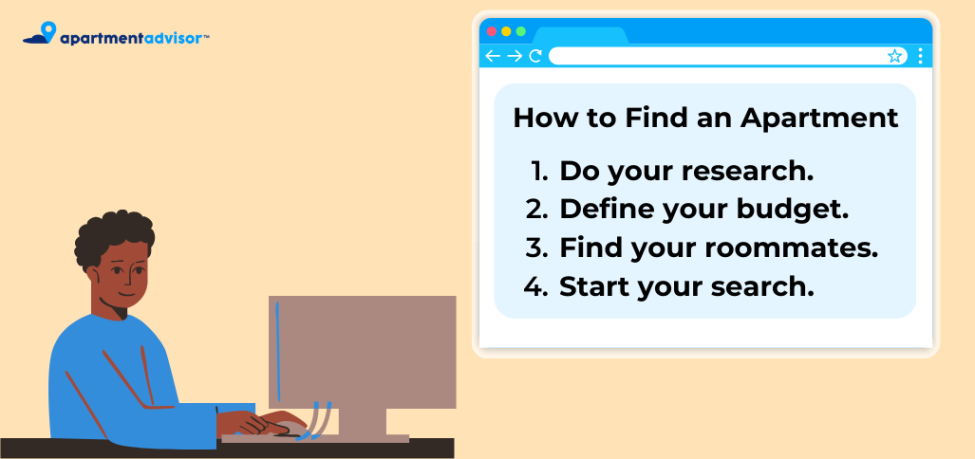
Starting an apartment search can feel overwhelming, even if it isn’t your first time renting. When you’re a student looking for an apartment, you’ll have to keep a few extra factors in mind, like:
- The distance between a potential apartment and your school (and public transportation options)
- Whether or not the apartment accepts student renters
- How much you can afford to pay in rent
Step One: Do Your Research
As an undergrad, your first step in your apartment search should be speaking with other students who have lived off-campus or, if your college or university has one, with school’s off-campus housing office. Speaking with people who are more experienced in the area’s rental market can help you narrow down your search to the right neighborhood, so you don’t waste your time looking in places that are too far from campus or don’t have a lot of student-friendly housing. We have provided neighborhood guides on a number of major cities with large student populations, like Boston , Austin , Philadelphia , and Washington, DC as well.
Timing will be another factor that varies hugely depending on your rental market. In some cities, like Boston , it’s common to sign a lease in January with a move-in date of September. In others, like New York City , you may be signing a lease only weeks before your move-in date. Find out what the average renting timeline looks like in your college town well in advance so you are left with plenty of options.
Doing your research on the area where your college is located will also help you determine whether you will need to work with a real estate professional during your apartment hunt. In some markets, like in Boston, most renters must work with a broker to rent an apartment (which means paying a broker’s fee, which we will provide more detail on later in the guide.) In others, like Austin or Dallas , many renters work with an apartment locator, who focuses on rentals, instead.
In addition to fellow students and your school housing office, the internet can be a great resource to learn about how your rental market works. Look into housing-specific subforums on Reddit or Facebook groups. There may already be a group on Facebook dedicated to helping students find off-campus housing and roommates for your area.
If you are located in Boston or New York City and want a little extra guidance while renting, ApartmentAdvisor can help. Our Verified Listings program (coming soon to other markets!) gives you access to select properties that we’ve vetted. Plus, if you inquire on a Verified listing, our expert advisors will walk you through the whole renting process — from setting up tours to signing a lease. View Verified Listings in Boston and New York .
Step Two: Define Your Budget
Our general rule of thumb for renters is to spend no more than 30% of your monthly income on rent — but this can be a grey area for students who are renting, but not working full-time. Your budget will depend on your financial situation.
Have your parents or guardians allotted a certain amount of funds to go toward your housing? Do you have a housing stipend or scholarship money from your school? Are you using your own income or a loan to pay for your housing?
Figure out how you intend to pay your rent each month, and then determine a budget from there. It may not be reasonable to spend only 30% of, say, a stipend from your school on housing — but let that figure serve as a guide for how you want to organize your budget. Keep in mind that you can’t commit all of your budget to rent, since you’ll also need to factor in the cost of purchasing food and groceries (especially if you do not have a meal plan), utilities, transportation, and other essentials.
It's important to know your budget early on in the process because it will help determine a few areas of your search, like whether you will need to live with roommates (and if so, how many), what neighborhood you will be able to afford to live in, and what type of building. Use your budget to determine exactly what kind of apartment you’re looking for. I
For help determining your ideal rent payment, try our free, quick, and easy-to-use rent calculator , which even allows you to factor in monthly recurring expenses when determining your budget.
Step Three: Find Your Roommates

Once you are armed with information about what neighborhoods and types of buildings you’re interested in, you are just about ready to actually start your apartment search.
If you decide that you want to live with roommates, you’ll need to find and pick them before you start seeing apartments and filling out any applications — as many properties will require you all to apply together simultaneously. (If you’re going to live solo, then go straight to the next step on our list.)
Perhaps you already have someone in mind. If so, great! If not, considering asking around as a friend may know someone else in need of a roommate, or if you don’t mind living with a stranger, try looking at housing groups on Facebook. In either case, just make sure you are compatible first before proceeding.
Before moving in with a roommate, whether a friend or a stranger, it's important to make sure you not only like each other's company, but that you're well-suited to live together. For example, you're in the same stage of life; you're both neat freaks, messy types, or somewhere in between; you keep similar hours; you're both morning people or night owls; you're both dog people or cat people or really not pet people at all.
For more details on finding a roommate and determining compatibility, read our full guide on roommates.
Step Four: Start Your Search
The process of your apartment search will be unique to your rental market, but in most cases, a good apartment hunt starts online.
On ApartmentAdvisor , you can key in specific neighborhoods or cities into our search bar. We give every listing a deal rating to let you know if an apartment is fairly priced for the market. When searching for a place online, make sure to adjust the filters so that you only see apartments with the correct number of bedrooms, the right rent price, and a feasible move-in date. Then comes the fun part! Scroll through the listings and try to picture yourself in your future home. If an apartment is within budget and seems like it is in a nice building and neighborhood, feel free to schedule a walkthrough to get a better sense of the space. Write a list of questions you want to ask about the apartment before you tour to make sure it meets your needs.
If you are in a situation where you need to rent sight unseen — like if you are currently located out-of-state and can’t travel to apartment tours — then you may want to schedule a video or virtual tour and read up on our resources about sight unseen renting .
However, if you are located nearby and a landlord does not want to allow you to do a tour, you may be facing a potential rental scam. Be wary of any listings that seem “to good to be true” or any landlords who are trying to rush you through the process without doing any due diligence. We offer a detailed guide on rental scams and how to avoid them in our Renter Guide .
Craigslist, Facebook groups, and Facebook marketplace are also areas online where you can find apartment listings.
How to Fill Out a Rental Application
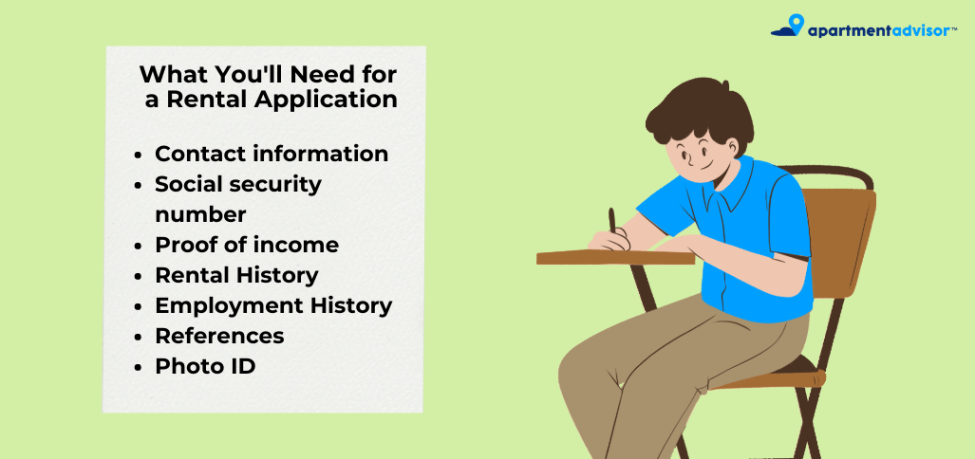
Hopefully, during your apartment search, you’ll find a great place that’s student-friendly, within your budget, close to your college, and just what you were looking for. Then, it’ll be time to start filling out your rental application.
Depending on how competitive the rental market you are looking in is, you may need to start filling out your rental application the same day you toured an apartment. It’s helpful to go into a search knowing what information you’ll need to rent an apartment . Most rental applications will ask prospective tenants for the following:
- Contact information
- Social security number
- Proof of income
- Rental history
- Employment history
Some applications will also require you to pay a fee, which is perfectly normal in some rental markets and illegal in others, like in Boston. Do an online search on your local laws and know your rights before you pay a fee.
Mostly everything else you’ll need is pretty straightforward, but if you’ve never rented an apartment before, you may be a little confused about what to put under rental history or references. Above all else, be honest in your rental application about your situation.
If a property is student-friendly, you won’t be the first applicant to be a first-time renter. In the space for rental history, you can explain that you are a student who currently lives at home or in a door room.
While former landlords or property managers make the best references, they aren’t the only option. Former and current employers or co-workers can directly speak to your work ethic and verify your income, but can also comment on how you are a responsible, helpful, and kind person at work. Family friends, mentors, and community leaders can make effective references if they know you well and are willing to vouch for your character. For more information, read our guide on references.
If a potential landlord is hesitant about your application or if you are worried about losing out on your dream apartment, you may want to attach a one-page cover letter to your application. While it’s not required, a cover letter can put your application over the edge in a competitive market. If you are already a very strong applicant, use your cover letter as an opportunity to explain why you would be a great fit for this apartment, what you love about the property or neighborhood, and what you will bring to the community as a tenant.
It can be a very powerful personal touch, and can make your application seem more human. Cover letters — or, if you are applying to an apartment digitally, emails — are one of the best ways to make a good first impression on a potential landlord. Read our guide for even more tips on strengthening your rental application.
Guarantors & Co-signers
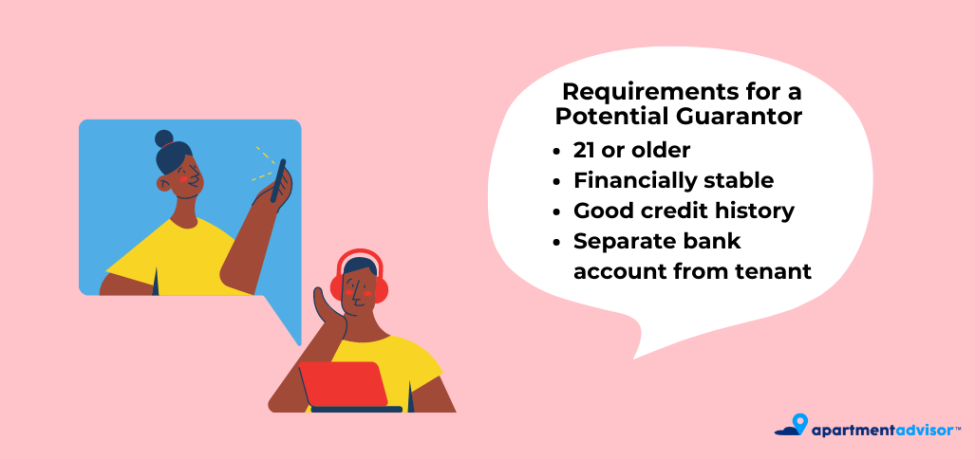
One possibility is that your potential landlord accepts your application, pending the addition of a guarantor or a cosigner on your lease. A guarantor is an individual who signs a lease guaranteeing that they'll cover any rental fees the tenant is unable to pay. They sign the apartment lease along with the tenant, much like a cosigner does for a loan. A cosigner does the same (with the only difference between the two being that a cosigner can legally inhabit the rental unit.) The two terms are often used almost interchangeably.
If and when a renter needs a guarantor depends on several factors, including credit score, credit history, and income, to name just a few. For first-time renters early in their careers, it is not uncommon to need a guarantor for an apartment lease. Young roommates will often need more than one guarantor on a lease, so you and all of your roommates may each need to find someone to sign the lease with you.
Consider asking close friends, family members, or others with whom you have a strong relationship to cosign your lease with you. Just keep in mind, guarantors must meet the following requirements:
- Individuals must have state-issued identification and be at least 21 years or older.
- Guarantors must have good financial stability.
- The guarantor must have a good credit history.
- This individual must have a separate bank account from the tenant.
- They must furnish financial documents, including bank statements, pay stubs, and tax returns.
For more information, read our full guide on guarantors.
Signing a Lease
Once you’ve gotten approved for your new pad, it’s time to sign the lease! This may be one of the first contracts that you’re signing in your life at this point, so make sure you read the fine print before proceeding. A lease agreement is a legally binding contract, and you need to be aware of what you are agreeing to do.
While your lease terms will vary from apartment to apartment — and even more so across different states — there are a few standard terms you can and should look out for before signing your lease.
Confirm that the amount of monthly rent due (plus which day of the month it’s due) lines up with what you were told during the application process, as well as the start and end date of the lease. Most agreements are for a one-year lease — and you may have a hard time finding a short-term lease if you do not intend to stay the full year. If this is the case, consider finding an apartment that will allow you to sublet for part of the lease if, say, you don’t plan on staying in the apartment over the summer.
Also look out for what the lease says under the term “right to entry.” Even though your landlord owns the property you are living in, you have rights around their coming and going. In this section, your landlord will explain under what circumstances they are allowed to enter your space. Many states require that a landlord must give a tenant proper notice in writing at least 24 hours prior to entering.
Other terms and restrictions that may be in your lease include:
- Any additional fees you can expect and why
- What common areas are free for your use, if any
- How long you are allowed to have guests staying at your apartment and other rules on occupancy
- What the expectations are for your cosigner or guarantor, if you have one
- If there are quiet hours, and what penalties are for excessive noise
- What behavior could cause eviction
For a more in-depth look at common lease terms, read our full guide.

Moving is expensive — and it’s not just because of all the furniture you’ll have to buy. When you rent an apartment, you’ll most likely need to pay your landlord your first and last month’s rent, and a security deposit equal to one month’s rent. That means, at the signing of your lease, you’ll need three times the cost of one month’s rent. If you worked with a broker, they will also require you to pay a fee equal to one month’s rent — meaning you’ll actually have four times the monthly rent due at your lease signing. (The security deposit will be placed in a bank account and returned to you at the end of your lease, minus any fees required for repairs on property damage.)
Not to mention, there are other apartment fees that can sneak up on you. As we mentioned earlier, some landlords will require you to pay an application fee, while others will tack on an “admin fee” as well, which is supposed to cover the time and expense associated with tenant screening and vetting, such as answering questions, confirming employment, checking references, and executing the rental agreement. Amenities like parking may also come with a price tag. If you are moving in with a pet, you may need to pay a pet deposit as well as a monthly pet rent in some buildings.
Some landlords may even require you to purchase renters insurance for the duration of your tenancy, so be aware of all fees that will be expected of you before signing your lease.
So, the ink on your lease has dried, and you are nearly across the finish line. Congratulations! Now it’s time to start planning your move. There’s more to the process than packing. Aside from making sure you have enough moving boxes, bubble wrap, and packing tape, there are many other details you must attend to — that’s where a moving checklist comes in handy.
Ideally, you’ll have a few months to get organized. We recommend that you start packing non-essential items (like off-season clothing, extra linens, and decorative items) about two months out from your move. If you will be using professional movers to help you get settled into your new space, this is also a good time to start researching companies.
As your move-in date gets closer, you can start packing more and more items you aren’t planning on using until you relocate. Aim to have almost everything boxed up about two weeks before your move-in date. And trust us, label your boxes. It’ll make unpacking much smoother.

No matter how much you pack, it’ll be hard to avoid a trip to the grocery store or your local Target once you finally get into your new place. We’ve created a practical, printable, interactive checklist of essentials for your first apartment.
When you first move in, focus on the items you’ll need right away, like:
- Lighting if your apartment doesn’t have overhead lights
- A bed and linens
- Bathroom essentials like towels, bathmats, a plunger and toilet brush, a trash can, and toothpaste
- Cooking essentials like a basic pot and pan set, a set of dishware and silverware, kitchen knives, sponges, and dish soap
- Cleaning essentials like a broom, dustpan, mop, and all-purpose countertop cleaner
Click here for our full checklist.
The Bottom Line
Moving out seems daunting, but it’s an important first step to adulthood. As long as you have done your research, you’ll be prepared for your first apartment search — even if there are a few extra steps for student tenants, like finding a guarantor. Just remember to stay organized, and to keep budget and timing in mind.
You may also enjoy...

Apartment Renter’s Guide to Rental Scams

Is Winter the Best Time to Negotiate Rent?

Walk-Up Apartment — The Pros, Cons & Considerations
Find the best deal
We rate and sort every listing based on fair market rent.
Top metro areas
Atlanta Metro Apartments
1,461 apartments starting at $600/month
Austin Metro Apartments
1,398 apartments starting at $522/month
Baltimore Metro Apartments
728 apartments starting at $550/month
Boston Metro Apartments
5,045 apartments starting at $650/month
Charlotte Metro Apartments
914 apartments starting at $499/month
Chicago Metro Apartments
3,267 apartments starting at $625/month
Dallas Fort Worth Metro Apartments
2,520 apartments starting at $400/month
Houston Metro Apartments
1,032 apartments starting at $595/month
Las Vegas Metro Apartments
1,067 apartments starting at $675/month
Los Angeles Metro Apartments
4,669 apartments starting at $595/month
Miami Metro Apartments
480 apartments starting at $1,025/month
Milwaukee Metro Apartments
743 apartments starting at $500/month
New York Metro Apartments
2,379 apartments starting at $595/month
Orlando Metro Apartments
1,028 apartments starting at $550/month
Philadelphia Metro Apartments
1,758 apartments starting at $450/month
Phoenix Metro Apartments
1,685 apartments starting at $700/month
Pittsburgh Metro Apartments
1,113 apartments starting at $500/month
Portland Metro Apartments
1,604 apartments starting at $695/month
Raleigh Metro Apartments
810 apartments starting at $475/month
San Antonio Metro Apartments
1,029 apartments starting at $550/month
San Diego Metro Apartments
1,522 apartments starting at $590/month
San Francisco Metro Apartments
1,653 apartments starting at $850/month
Seattle Metro Apartments
1,531 apartments starting at $525/month
Tampa Metro Apartments
974 apartments starting at $750/month
Washington Metro Apartments
708 apartments starting at $550/month
Community Rentals
Off-Campus Housing
Rental Application Packet

A Rental Application Packet provides the landlord with comprehensive information about you and those in your group. A good packet helps you stand out as a prospective tenant. Download a sample, and scroll down to learn more about what to include.
Sample Rental Application Packet (PDF)
ON THIS PAGE
Cover letter, rental resume, rental application, housing reference release.
Rental references
Renters Workshop certificate
Credit report, letter of guarantee.

Include a brief cover letter that gives an overview of your household. Mention your interest in the rental and your ability to be a responsible tenant. If you have a credit report or letter of guarantee, note it here.
Your rental resume provides an opportunity to expand on what is included in your application and credit report. Use our sample rental resume as a guide for creating your own. If you are renting with a pet, you can also include a pet resume (PDF).
Sample Rental Resume (PDF)
The landlord may provide you with an application form, but having your information in one place will save time and show that you are prepared. Download our rental application and fill it out completely. Instructions are on the second page of the form.
Rental Application (PDF)
You can authorize university housing staff to serve as a rental reference for your on-campus rental payment history. Your first step is to submit the form under “Releases” in the Housing Portal.
Visit the Housing Portal
Next, download and fill out the “How to Check Rental References” form below to include in your packet. This gives potential landlords the information they need to check your on-campus references.
How to Check Rental References (PDF)
Rental references
In addition to the Housing Reference Release described above, get written references from a current or previous employer if possible, and include them in your packet. This can help show prospective landlords that you are personally and financially responsible.
Many landlords and property managers accept this certificate as a type of “reference”, as it shows you completed the training and are a knowledgeable prospective tenant. Complete the online Renters Workshop and quiz to receive your certificate.
Confidential: provide on request
Get a credit report on yourself. No credit is better than bad credit so even a credit report with no history is of some value. Free credit reports are available at annualcreditreport.com . Many landlords and most professional property managers will want to use the credit reporting company they are accustomed to, but having one ready may get you through the “first cut.” Make note in your cover letter that you have one available but do not include it in the packet.
Many landlords who rent to students require a co-guarantor for the rent. Mention in your cover letter that you will provide one upon request and have the form filled out and ready to go, but only give to landlords seriously considering your application.
Letter of Guarantee (PDF)
Bookmark our Move-In and Move-Out checklists so you can return to them when you find a place. Following the steps outlined can help ensure you get your security deposit back, and gain a positive rental reference from your landlord to use when looking for your next place!

REIQ Real Estate Registration Course
Start your career.
Full Licence
For Business Owners, Principals, Contractors (and flexibility!)
Registration to Full
For those looking to get ahead in real estate.
Auctioneer Licence
Conduct real estate auctions
Certificate IV
Real Estate Practice (CPP41419)
CPD Program
Acquire Continuing Professional Development Points
Real Estate Apprenticeship
Learn more about apprenticeships
Commercial Property Management Essentials Program
Commercial Sales Essentials Program
Commercial PM Operations Program
Property Management Essentials Program
Residential Sales Essentials Program
Upgrade to a Full Licence
Real Estate Auctioneer Licence Upgrade Course (from Registration)
Upgrade to an Auctioneer Licence
Real Estate Auctioneer Licence Upgrade Course (from Full Licence)
Real Estate Recognition of Prior Learning (RPL)
Be formally recognised for existing skills
What we have on offer
Why Train with REIQ?
What the peak body can offer you
Why Study Real Estate?
Benefits of a real estate career
REIQ Student Handbook
Important guide for future and current students
Real Estate Training FAQs
Answers to common questions
Real Estate Career Path Quiz
Find your perfect career path
Request a Free Realworks Trial
Realworks HR
Contracts, forms, policies and templates
Real Estate Shop
Purchase hard copy contracts
Complete all your real estate forms, contracts and agreements online
Recent Realworks Improvements
Cloud-based, entirely online, secure and portable
Realworks Help Guide
Your guide for using Realworks
RealworksHR
RealworksHR Help Guide
Your guide for using RealworksHR
Individual Membership
Take your career to new heights!
Accredited Agency Membership
Make sure your agency is at the top of its game!
Graduate Membership
Everything you need to set your career on a course for success!
Join 15,000 QLD industry professionals
Member Services
Access exclusive member support services
Industry Jobs Board
List vacancies and find new opportunities
Industry Advocacy
Advocating on the industry's behalf
Discounts and Preferred Partners
REIQ recommended products and services
Property Management Support Service
Free expert advice on property management issues
Agency Advisory Service
Free expert advice on agency matters
Legal Advisory
Free legal advice on agency practice issues
Dispute Resolution
A dispute resolution service for members
Voting, Nominations and Eligibility
Vote at AGMs, nominate for Zone, Chapter and Board positions
Advance your network and skills
REIQ Awards For Excellence
28 October 2023
REIQ Sales Conference
2 March 2023
REIQ Property Manager Conference
22 April 2023
REIQ Women in Real Estate (WIRE) Lunch
1 March 2024
REIQ Golf Day
19 August 2023
Property Insider Lunch
28 July 2023
Career Networking Event
REIQ Webinars
Media Releases
Latest news for media outlets
Best Practice Guidelines
Expert advice for real estate professionals
Join Our Mailing Lists
Stay up to date with the latest real estate news
Government Submissions
REIQ's response to government policy
Domestic and Family Violence in Tenancies
Advice for property managers
REIQ Podcasts
Deep dive into current issues and trends
New Tenancy Laws Toolkit
Navigate the new rental reforms
REIQ Disaster Toolkit
Guidance on responding to natural disasters
Digital Marketing Toolkit
Flood Support
Fundraising for agents and people in need
Agency Practice
News and Updates
Property Investment
- Property Management
Property Sales
REIQ Student Support
Need help with your course?
- Real Estate Institute of Queensland
Rental application cover letter Tips to standout

- 12 Jun 2023
- By James Price
Rental application, Cover letter, tips
A cover letter is a crucial aspect of your rental application process, as it gives you the opportunity to make a positive first impression on the property manager or landlord, also known as the lessor. It showcases your personality, work history, and lifestyle.
A cover letter can greatly impact the decision on whether you are given the tenancy. In this article, we will provide you with valuable tips on how to write an outstanding rental cover letter that will help you stay a step ahead of the crowd.
What is a cover letter for a rental property?
A cover letter for a property available to rent, also known as a renter cover letter, is a document that accompanies your application for the property, explaining why you would make a great tenant.
This letter serves as an introduction to the lessor and gives you the chance to showcase your personality, work history, and lifestyle. A well-written renter cover letter can help you get a step ahead of the competition and increase your chances of being approved for the property you desire.
Why do I need a renter cover letter?
A renter cover letter is an excellent way to make a positive first impression and demonstrate your professionalism to the lessor. It's the perfect way to introduce yourself and your suitability for the rental.
Advantages of a cover letter
By including a cover letter, you are showing that you are taking your application for the rental home or apartment seriously and are willing to go the extra mile to secure your desired property. This can set you apart from other renters and increase your chances of being approved. There can be a lot of prospective tenants, especially in a competitive market, making it crucial to stay a step ahead in any way you can.
Who reads a rental cover letter?
Home rental applications are typically read by a property manager or lessor who is responsible for screening potential tenants and making decisions on who to rent to. This person will evaluate your renter cover letter and ultimately decide if you are fit for the property.
Is there a criteria lessors look for?
Yes, there are certain criteria that property managers and landlords look for when evaluating applications from potential renters. Some of these include:
· Stable employment status and history
· No history of eviction
· No criminal record
· Ability to pay rent on time each month
· Positive rental references
By including this information in your application, you can demonstrate to the lessor that you meet their criteria and would make a responsible and reliable tenant.
Things to include in your rental cover letter
1. Introduction: Start your cover letter by introducing yourself and your reason for applying for the rental property.
2. Lifestyle: Provide a brief description of your lifestyle and why you are looking to move. If you are planning on sharing the house with family or housemates, introduce them as well.
3. Employment History: Summarise your past occupations, including your current job and how long you have been in your current position. This will demonstrate your stability and ability to pay rent on time.
4. Hobbies: Share your hobbies and interests. This can help the lessor get to know you on a personal level and can set you apart from other applicants.
5. Thoughts on Good Neighbors: Discuss your thoughts on what makes a good neighbor and how you plan to be an active member of the community.
6. Rental References: Provide the names and contact information for at least two previous lessors who can provide a positive reference for you as a tenant.
How to format a rental cover letter?
Like most application forms, following a clear and concise format can help leave a lasting impression. When writing a rental cover letter for a rental application, it is important to present yourself in a professional and organised manner. Start by including your contact information, followed by the date and the lessors information. Be sure to use a clear and legible font, such as Arial or Times New Roman, in a font size of 12 points.
In the first paragraph, introduce yourself and state the reason for your letter. Mention the specific property you are interested in and what about the property appeals to you.
In the second paragraph, highlight your job history, including your current position and how long you have been employed there. If you have any relevant work experience, such as property management or customer service, be sure to mention it.
In the third paragraph, discuss your hobbies and interests and how they fit in with the community you are applying to live in. For example, if you enjoy outdoor activities and the property you are applying for has a pool, mention that you look forward to spending time by the pool with your family.
In the fourth paragraph, discuss what you believe makes a good neighbor. Explain that you value a peaceful and respectful community and that you take pride in maintaining your living space.
In the final paragraph, include any rental references you have, including previous lessors and you have any personal references, such as friends or coworkers, who can speak to your character. Feel free to include them as well.
When concluding your cover letter, thank the property manager or landlord for considering your application and express your eagerness to hear back from them. Be sure to sign your name in ink, and include a copy of your application for the property.
Tips for writing a winning rental cover letter
1. Customise your rental cover letter: Each application is unique, so it is important to tailor your letter to each property you are interested in. This will show that you have taken the time to research the property and that you are genuinely interested in becoming a tenant.
2. Use a Professional Tone: Make sure to use a professional tone when writing your cover letter. Avoid using slang or overly casual language. Address the lessor by their proper title, such as Mr. or Mrs., and use proper punctuation and grammar throughout the letter.
3. Showcase your personality: While it is important to be professional, don't be afraid to showcase your personality and let your character shine through. This can help the lessor get to know you on a personal level and can set you apart from other applicants.
4. Be concise: Keep your cover letter short and to the point, focusing on the most important information. Aim for around 200-300 words, and avoid repeating information that is already included in your application.
5. Showcase your Responsible Nature: Landlords and property managers want to rent to tenants who are responsible, trustworthy and reliable. Highlight your responsible nature by discussing your previous rental experience, any positive feedback from previous lessors, and your ability to pay rent on time.
6. Explain Your Personal and Professional Goals: Lessos wants to rent to tenants who have a stable and long-term plan. Explain your personal and professional goals in your cover letter, and how renting the property fits into your long-term plans. This can give the lessor confidence that you will take care of their property and stay for a longer period.
7. Offer to Provide Additional Documentation: Offer to provide additional documentation such as employment contracts, pay stubs, and bank statements to support your application. This shows that you are proactive and willing to go the extra mile to secure the rental.
8. Close the Letter on a Positive Note: End your cover letter on a positive note by expressing your gratitude for the opportunity to apply for the rental and your excitement about the potential of living in the property.
9. Proofread and Edit Your Cover Letter: Before submitting your letter, make sure to proofread and edit it for grammar, spelling and formatting errors. A well-written and professional letter can help you stand out from other applicants and increase your chances of securing the rental.
Additional tips for securing the rental property
1. Follow Up with a Phone Call
After submitting your rental application and cover letter, follow up with a phone call to the lessor to inquire about the status of your application. This shows that you are interested in the property and that you are proactive in your search for a new home.
2. Be Prepared for an Interview
If your cover letter and application are well received, you may be asked to come in for an interview. Be prepared to discuss your employment history, lifestyle and other relevant information in detail.
3. Ask Questions During the Interview
During the interview, be sure to ask the landlord or property manager any questions you may have about the property or their expectations for tenants. This shows that you are engaged and interested in the rental process.
4. Follow-Up After the Interview
After the interview, follow up with a thank you note or email to the landlord or property manager. This will help keep your application at the forefront of their mind and show that you are still interested in the property.
5. Know Your Rights as a Tenant
It is important to familiarise yourself with your rights as a tenant, including your right to privacy, the right to a safe and habitable living environment, and the right to access certain amenities, such as a swimming pool or laundry facilities.
6. Be Patient
The rental process can take time, so be patient and keep your options open. If you are not selected for the property you applied for, don’t be discouraged. Keep searching for other properties and continue to improve your application materials to increase your chances of success.
First impressions count and a well-written cover letter can be the key to securing the perfect apartment or house. By showcasing your personality, providing a detailed employment history, and highlighting your interests and values, you can set yourself apart from other applicants and increase your chances of landing the rental. Remember to be professional, thorough, and patient, and you will be well on your way to finding your dream rental.
Are you planning on moving into a property with pets? Read about the laws regarding pets in rental properties here . Have another question relating to property managers? Search your query through our extensive library here .
You may also like View All Articles

15 Nov 2019
Are your property transactions safe from cybercrime?
The property market is the perfect playground for cybercriminals - large sums of money are constantly being transferred between parties with the majority of communications sent via email.

Be careful what you do with confidential information
The recent settlement of a claim between a real estate agency and a former employee serves as a timely reminder to real estate professionals that utilising a former employer's confidential client information can be very costly.
Data, Theft, Customer, Data, Case study, HR

Beware of misleading and deceptive conduct in advertising
Extreme care must be taken by agents to ensure that all representations are accurate and will not fall foul of the consumer protection legislation.
Legislation, Marketing, Advertising, Misleading and Deceptive Conduct

Start your Real Estate Career
Need help? 1300 697 347 or contact us

What is a Renter Cover Letter?
Help boost your potential to access competitive rental housing markets..

Lauren Maier
October 25, 2019
A renter cover letter is a letter written by wannabe renters for potential future landlords or property management companies. Rental cover letters are meant to showcase a renter's character and best attributes to boost their reputation and odds of getting the desired lease.
What to include in a renter cover letter
Rental cover letters should help convince a potential landlord or property management company that you are the best person to fill their unit. Provide examples that showcase your reliability, professionalism, lifestyle preferences that are similar to those of other renters and people in the community, or examples of how you have contributed to communities in the past.
It's also a good idea to include this like employment history, credit history and several references in your letter. Landlords aim to ensure their tenants are responsible and will take care of the property, follow the rules and pay rent and fees on time.
Credit and employment history will convince landlords that you're able to pay your rent and are reliable when it comes to paying your bills on time.
Make sure you add these details to your renter cover letter
- Information about yourself that showcases your professionalism and responsibility
- Positive histories like employment and credit
- A list of references who will attest to your character
When to write a renter cover letter
Rental cover letters are not always required, but writing one — especially when you're vying for a rental property in an especially competitive market — couldn't hurt your chances. Do some market research to determine how competitive the housing market is in your area. If it is, try to bolster your appeal to landlords with a letter.
Letters are worth the effort
Even if a rental cover letter is not required, writing a letter for your potential landlord can give your application an edge and help you secure your ideal living space in a competitive market.
With the guidelines outlined here, you'll have a great cover letter in no time — and the new apartment you've been trying to get into.
Additional resources
- Sample Letter: Renter Cover Letter
- Sample Letter: Renter Resume
- The Rental Application Process: What to Expect When Applying for an Apartment
- Who to Pick as a Referral for Your Apartment Application
- Apartment Application: Items You'll Need
About The Author
Lauren Maier entered the world of freelancing shortly after graduating from Florida State University with a degree in Editing, Writing, & Media in May 2018. Originally hailing from Fort Lauderdale, Lauren recently moved to Atlanta where she works in content creation and enjoys all the city has to offer in her spare time.
College Student Cover Letter Example (w/ Tips for 2024)

Navigating college, you've aced your exams, written A++ research papers, and delivered exciting presentations.
Your academic journey has shaped you into a specialist in your domain, and the world is eager to see what you bring...
Yet, the challenge of writing a college student cover letter feels more daunting than that trigonometry class you dreaded in your sophomore year.
Here's the good news: We've got your back!
By the end of this article, you'll know exactly what you have to do to write your student cover letter. Here’s what we’re going to cover:
- A Perfect College Student Cover Letter Example (to Inspire You to Write Yours)
- 5 Steps to Writing an Effective Student Cover Letter
- 3 Tips to Take Your Cover Letter from “Good” to “Great”
Let's dive in!
College Student Cover Letter Example

5 Steps for the Perfect College Student Cover Letter
You've just witnessed what a job-winning cover letter looks like. Now, it's your turn to craft one!
Just follow these 5 steps, and you’ll be as good as gold!
#1. Put Contact Information in the Header
When crafting your college student cover letter, it's essential to kick things off with your contact details . Just like on your resume, these should sit in the header of your cover letter.
Here's a breakdown of what to include:
- Full Name. Your first and last name should proudly sit at the top of the page.
- Intended Job Title. Match the job title on your cover letter to the specific position you're seeking. (E.g.: If you’re applying for the job of “Junior Marketing Manager,” use those exact words and not “Marketing Specialist" or “Advertising Executive.”)
- Email Address. Choose an email address that's professional and straightforward. A combination of your first and last name is a safe bet. (e.g.: [email protected] is good but [email protected] is not.)
- Phone Number. Ensure your provided phone number is accurate so that the hiring manager can reach you. If you're applying for a job in another country, add the international dial code.
- Location. Your city and state will suffice, no need to mention the address. However, if you're seeking a remote position or planning to relocate, be sure to mention it.
- Relevant Links (optional). If you have any relevant websites or social media profiles, such as LinkedIn, feel free to include them.
Once your own contact information is in place, it's time to add the hiring manager's details:
- Company Name. Clearly state the company you're applying to.
- Hiring Manager's Name. If you can find the name of the hiring manager for the specific department you're interested in, include it.
- Location. Specify the city and state or country of the company, especially if it's a global organization.
- Email Address (optional). If you manage to find the hiring manager's email address, it's a nice touch to include it.
#2. Address the Hiring Manager
Once you've got all your college student cover letter's contact info in place, the next step is addressing your letter properly.
You can always go for something generic like "To Whom It May Concern,” but if you want to stand out, you’re better off addressing the hiring manager directly .
Start by doing a bit of research. Take a look at the job listing, the company's website, or even their LinkedIn profiles. This will help you find the name and email address of the person who'll be reading your cover letter.
Next, address them in a formal but friendly way. You can use "Ms." or "Mr." followed by their last name. If you're unsure about their gender or marital status, just use their full name. Here are some examples:
- Dear Ms. Rodriguez
- Dear Alex Rodriguez
If you can't find any specific info about the hiring manager or the department head, it's okay to address your letter to the department or the company in general. Just keep it friendly and professional:
- Dear Marketing Department
- Dear Marketing Team
- Dear Human Resources
- Dear Hiring Team
#3. Write an Eye-Catching Opening Statement
Hiring managers typically spend around seven seconds evaluating a college student's application before deciding whether to read it thoroughly. So, making a strong first impression in your cover letter is vital.
In the opening paragraph, be sure to introduce yourself and explain why you're interested in the position. Expressing your enthusiasm for the industry or the specific job can grab the hiring manager's attention.
Doing a bit of research on the company can be very helpful here. The more you know about the employer, the better you can emphasize how well you'd fit into their work culture. This demonstrates that you're not just applying to random companies but are genuinely interested in this particular role.
You can also kick off your cover letter by mentioning a noteworthy achievement or showcasing the skills that make you an ideal candidate. Keep this paragraph short, though. The goal is to spark the hiring manager's interest and encourage them to read into your cover letter's details.
#4. Use the Cover Letter Body for the Details
The body of your college student cover letter is your chance to provide in-depth details that truly showcase why you're a perfect fit for the job.
Discuss courses, projects, or experiences that have given you skills relevant to the role. Additionally, share any extracurricular activities, volunteer work, or internships that align with the position.
For instance, if you're applying for a marketing role and you managed a social media campaign for a college club, that would be perfect to mention. It's also beneficial to highlight any soft skills, such as communication or teamwork, and give examples of when you've put them to use.
Next, demonstrate that you've done your research by mentioning something specific about the company that resonates with you, whether it's their mission, a product, or a recent accomplishment.
It's important to show how the company’s values or goals align with your experiences or aspirations. Every cover letter should be tailor-made for the job you're applying for, so make sure to emphasize experiences and skills that match the job description.
It can also be helpful to incorporate keywords from the job posting, especially if the company uses applicant scanning software for initial screening.That said, avoid the temptation to simply rehash your college resume - your cover letter should be a supplementary document, not a copy-paste.
Want to learn what a great cover letter looks like in different fields? Check out our cover letter examples !
#5. Wrap It Up and Sign It
Wrapping up your college student cover letter is the final touch that can leave a lasting impression.
It's essential to conclude on a strong note, ensuring that your conclusion reinforces why you're an excellent fit for the role.
In your conclusion, confidently recap your qualifications and the skills that set you apart from other candidates in the college student industry. Reiterate how your experiences align perfectly with the job.
Following your conclusion, it's time to include a call to action. Encourage the hiring manager to take the next step, such as initiating a discussion about your application. This proactive approach can significantly increase your chances of securing an interview.
Finally, select an appropriate closing line and follow it with your full name to end your letter like a pro.
Please feel free to contact me at the provided email or phone number to arrange an interview. I eagerly await the opportunity to discuss my application at your earliest convenience.
Warm regards,
Jodie Sawkins
And finally, if you prefer to explore alternative sign-offs to "Warm regards," here are some options:
- Best regards,
- Respectfully,
- Thank you for your consideration,

3 Essential College Student Cover Letter Tips
You've got the basics of cover letters down, and now it's time to take your college student cover letter to the next level with some essential tips .
#1. Match Your Resume
When you're a college student applying for a job, it's important to maintain a consistent application style.
Make sure your cover letter's format and layout closely mirror your resume template to create a professional and organized impression.
Align your text and contact details neatly on the page, keep font styles and sizes uniform, and set appropriate margins and line spacing.
By doing this, you'll present a polished and cohesive application while ensuring your cover letter stays on a single page.
Or Use A Cover Letter Template Instead
Don't want the hassle of starting from scratch? We've got you covered! Our cover letter templates are designed to save you time and ensure your cover letter pairs perfectly with your resume.
Crafted with insights from the world’s leading hiring managers, our templates meet industry standards and look fantastic.
#2. Focus on Extracurricular Activities & Internships
Chances are, as a student, you don’t have a lot of hands-on professional work experience.
That doesn’t mean you lack valuable experience that can impress potential employers.
Extracurricular activities and internships can play a pivotal role in showcasing your skills, dedication, leadership, and adaptability.
Participating in clubs, organizations, or sports can demonstrate skills like teamwork, leadership, time management, and problem-solving. For instance, if you were the captain of a sports team, it suggests leadership and dedication. If you were part of a debate club, it shows strong communication and critical thinking skills.
#3. Proofread the Final Draft
Proofreading your final draft is a crucial step when polishing your college student cover letter. Typos and bad grammar can quickly sabotage a great first impression.
First off, run your cover letter through Grammarly or any other online tool to find any mechanical errors.
Then, re-read it yourself carefully to make sure that the tool didn’t miss something important.
Finally, get a friend to give it a final review to make sure the cover letter is objectively good.
Key Takeaways
Hopefully, by now, you know all you need in order to create an effective college student cover letter.
Before you go and start applying for jobs, here’s a quick recap of everything we’ve covered in this article:
- Your cover letter is often the first introduction to a potential employer. Ensure it's polished, professional, and captures your qualifications effectively.
- Extracurricular activities, internships, and academic achievements can be valuable assets. Don't shy away from showcasing these experiences.
- One size doesn't fit all. Customize your cover letter for each position, emphasizing how your skills align with the job requirements.
- Hiring managers often skim through applications due to volume. Aim for clarity and brevity, getting straight to the point.
- Minor errors can be detrimental. Use online tools, seek feedback, and meticulously review your content before submission.
- Let your passion shine through. Employers value candidates who are not only qualified but also genuinely interested in the role and the company.

To provide a safer experience, the best content and great communication, we use cookies. Learn how we use them for non-authenticated users.

- Mover Types
- Best Long Distance Moving Companies
- Best Interstate Moving Companies
- Best Cross-Country Moving Companies
- Best Out-of-State Moving Companies
- Best Cheap Moving Companies
- Moving Services
- Moving Quotes
- Moving Labor
- Local Movers
- Long Distance Movers
- International Movers
- Canadian Movers
- Office Movers
- Piano Movers
- Moving Company Reviews
- Allied Van Lines
- Mayflower Transit
- Colonial Van Lines
- National Van Lines
- North American Van Lines
- United Van Lines
- American Van Lines
- Bekins Moving
- Wheaton World Wide Moving
- Moving cost calculator
- Moving company directory
- Plan your move
- Should you tip?
- Moving insurance
- Move cross country
- Moving a mobile home
- Moving Container Reviews
- 1-800-PACK-RAT
- Zippy Shell
- What Is a Moving Container & How Does It Work?
- How to choose the right size moving container
- Professionals Movers or Moving Containers?
- What Not to Pack Inside Your Moving Container
- Truck Rental Reviews
- The Home Depot
- Enterprise Truck Rental
- Moving Labor Reviews
- Best Moving Labor Companies
- HireAHelper
- U-Haul Moving Help
- How to pack & load a moving truck
- What size truck should I get?
- Should you buy rental truck insurance?
- Should you hire moving help?
- Free moving boxes
- Storage Reviews
- Best Self-Storage Companies
- Public Storage
- Extra Space Storage
- LifeStorage
- Simply Self Storage
- Junk Removal Reviews
- Best Junk Removal Companies
- 1-800-GOT-JUNK?
- College HUNKS Hauling Junk
- Waste Management
- Guide to renting a storage unit
- Organizing a storage unit
- How much does it cost to rent a storage unit?
- Items that require climate controlled storage
- How does junk removal work
- Free donation pickup
- Car Shipping Reviews
- Best Car Shipping Companies
- AmeriFreight
- How Much Does It Cost to Ship a Car?
- How to Transport a Car to Another State
- Preparing Your Vehicle for Auto Transport
- Before You Rent a Car Trailer: Cost and Tips
- Moving Cost Calculator
- Packing Calculator
- Move Planner
- Mortgage Calculators
- Moving Announcements
- Guides & Advice
- Moving Articles
- School Ratings
- City Profile
- Compare Cities
- Daily Market Commentary
- Edit My Account
- How to Make Your Rental Application Stand Out >
How to Make Your Rental Application Stand Out
Share this:

You’ve found an apartment that checks all the boxes—great location, ideal amenities, even the right price. Unfortunately, you’re not the only one that thinks it’s the perfect place to live. Other prospective tenants are considering the property, too. So, how do you make your rental application stand out?
Start taking steps as soon as you decide it’s time to move so you’ll be ready to present yourself on the application in the best possible light. Here’s a detailed breakdown of what to do to ensure you’re the one signing on the dotted line and hanging a “Home Sweet Home” sign on the wall.
Before you complete the application
One of the biggest mistakes you can make when it comes to your application is being unprepared. During the time you spend trying to gather necessary information and find good referrals, someone else can fill out an application and be approved. Or, in your haste, you might appear disorganized and make a bad impression. Don’t let that happen! Before you begin searching for that perfect rental , take these steps.
Gather your documents
When you apply, you’ll need to prove you are who you claim to be and you can afford to live in the rental property. That requires you to first provide a government-issued identification such as a driver’s license, state ID, passport or green card. Make sure the photograph is unquestionably you—if it you appear drastically different, find another form of identification—and the information on it doesn’t contradict the information you’ll be putting on your application.
You’ll also need current pay stubs, bank statements and last year’s filed tax return to prove you can pay your rent. If you are self-employed, the bank statements and tax return should suffice, but you may also want to be prepared with a statement from your current landlord stating you pay your rent on time.
To make things easier, scan these documents and have them available electronically. That way, you can easily forward them to the landlord or property manager when requested. Additionally, if you are going to have roommates, encourage them to follow your lead and prepare ahead of time, too.
Check your credit score
Someone, at some point in the process, will check your credit score. Be prepared. Pull your credit score for free at AnnualCreditReport.com , a site sponsored by credit reporting agencies Equifax, Experian and TransUnion. Scores range from 300 to 850. Anything above 700 is considered good credit while anything between 620 and 699 is average. Below 620 is considered bad credit.
Ideally, you want your credit score to be above 700, especially if you are competing against other people who want to rent the same property. However, you can raise a low score by paying off debt. (It will take a few months for your credit score to reflect your reduced debt, so if you have bad credit and can wait, consider postponing your move.)
Surprised by how low your credit score is? Review it carefully for inaccuracies, such as closed accounts being reported as open or the same debt being listed more than once. If you find an error, contact the credit reporting agency to dispute it. Similarly, review your personal information and report any discrepancies to the agency. Different addresses than the ones provided on your rental application, for example, could be a red flag.
Secure a guarantor
You don’t have to give up on your dream property if you have a low credit score or no credit score at all. Find a guarantor or co-signer, someone who will pay your rent if you don’t and cover any damages you leave behind.
Since a co-signer will also have to show proof of identity and the ability to pay the rent if you can’t, he’ll need to get his documents and information ready ahead of time, too.
Write a cover letter
A cover letter can help you stand out among a sea of other applicants. Write a professional, error-free letter telling a little about yourself, why you are moving and what you like about the property. It’s a good time to mention any pets (add obedience training certificates, immunization records and emotional support/service animal registration to your gathered documents pile), too.
Your cover letter should also address any potential issues, like a gap in employment or bad credit. Just be careful in the way you explain the situation. It’s okay to say your credit took a hit following a divorce, but don’t rant about how awful your ex is. Your application may stand out but probably not for the reasons you want.
Not one for writing? Make a video instead. You’ll want to address the same issues as above and be personable, just as you would in the letter. Before filming, test your audio quality and check your background. A messy living room or a pyramid of last night’s beer cans might be a turnoff to a landlord.
Line up your reference
You’ll need to have at least three references. Determine who would make a good reference, and reach out to them before you start filling out applications.
Obviously, some references are better than others. Your current landlord or property manager is probably the best reference you can have because they can answer questions about how you take care of the property and pay your rent. Another good option is your employer. Avoid listing your best friend from high school or your parents; their reference will carry little weight.
Overhaul your social media
What will the person reviewing your application find if they Google you or look up your social media accounts? Before you apply, comb through your social media pages and remove anything that might be a red flag to a landlord, including references to parties, alcohol and drugs and photos with messy rooms in the background.
On the application
What you include (or don’t) on your application can have a big impact on whether it stands out or is shuffled to the bottom of the pile. In addition, certain issues raise red flags on the application. Avoid them by taking the following steps.
Fill in the application completely. An incomplete application will raise eyebrows. If you can’t remember the information being asked for, you’re better off taking the application home and submitting it the next day.
Be truthful. Even worse than leaving something blank is providing incorrect information. For example, providing a wrong address could look like an attempt to hide your rental history. An incorrect job title could make the landlord think you’re lying about other information, too.
Provide landline numbers. Don’t leave the landlord wondering if they’re really talking to your employer or your best friend. Write down the company’s or current landlord’s main phone number.
Don’t lie about pets. Maybe you can avoid a pet deposit by saying you don’t own one, but sooner or later, your landlord will find out, no matter how hard you try to hide it. Be upfront. Show him your pet’s obedience training certificates, or ask your current landlord to testify to how well-behaved he is.
Follow up on your application
After you submit your application, it could be several days before you hear anything from the landlord or his property management company. Usually, you will hear from someone if they have questions or need follow up information. Always try to be helpful and pleasant. Reply as quickly as possible, and provide any requested information in a timely manner, the sooner the better.
If you haven’t heard anything within a few days, it’s okay to follow up. Just be polite and not overly pushy.
Moving to your new rental
Once your application is approved and you sign the lease, it’s time to start planning your move. To find the best moving company to help pack and move your belongings, check Moving.com’s extensive network of reputable and reliable movers. All relocation companies in our network are licensed and insured, so you can rest assured that the move to your new rental home or apartment will go smoothly
Related Articles:
- How to Negotiate If Your Landlord Raises Rent
- Understanding How the Eviction Process Works
- How To Get Rental Assistance
- Got An Eviction Notice? Here’s What To Do
- 10 Signs That a Rental Isn’t in Good Condition
- 9 Benefits of Renting vs. Owning a Home
- 7 Times It Makes More Sense to Rent Furniture Than Buy It
- 8 Landlord Obligations to Know About If You’re a Renter
- 10 Must-Dos When Renting a Home
- A Move-In, Move-Out Checklist for Landlords & Tenants
Author: Teresa Bitler
Teresa Bitler has been covering moving, real estate, home improvement and home decor for more than 15 years. She enjoys writing articles about moving to specific cities, like Denver or Nashville, and what to expect when you get there. She also likes to write about home improvement and getting your home ready for a move. As a real estate investor, she wrote extensively for Personal Real Estate Investor. She has also written for Su Casa, US News & World Report and local publications about home improvement topics. Bitler currently lives in Phoenix, and although she’s moved too many times to count, she plans on staying put—at least for a while. View all posts by Teresa Bitler
- Mudanzas (Spanish)
- Do not Sell My Information
- Join our Network
- Client Login
- Accessibility
- Privacy Notice
- Terms of Use
- Review Guidelines
Move, Inc. Sites
- realtor.com ®
- SeniorHousingNet.com

How To Write A Rental Cover Letter
How to Write a Rental Cover Letter
In the rental market, especially within cities, good rental properties go fast. If you want a good deal on a good place in a good location, you have to do more than just be the first person to inquire. You have to be prepared to immediately view the property, fill out an application, and-most importantly-woo the landlord. Landlords want to feel safe leasing their property, which means you have to present yourself correctly. There's no better place to start than your inquiry cover letter. Your cover letter should establish three things:
- Who you are. Make yourself a person whom the landlord can connect to. You might find yourself meeting important markers for the landlord, too. A landlord wants a responsible tenant who is going to care for the property and not tear it up. Therefore, you'll want to highlight the things that make you attractive: If you're a single family, that decreases the likelihood that people will drop off the lease. If you like to garden or tinker, that indicates you'll care for the property. Bring up the nature of your job so that the landlord knows you have a steady income, but also knows what kind of person you are and the things you enjoy.
- Who you aren't. If you're young, if you're applying in a group, if you're a musician, if you have a dog-any of these qualities may be potential red flags to a landlord. Therefore, make sure you address your potential downsides directly and assuage fears about who you might be. If you're four young college students, lead with, "We are all gainfully employed and none of us enjoy loud music or large parties. We prefer to garden and play board games in our spare time." If you have a dog, be sure to talk about its good training and behavior. Put the fears to rest before they can crop up.
- Financial and rental responsibility. Describing your stable job and income is a good start, but it's also worth it to mention how responsible you are. A line such as "I always pay my bills on time and I have never been evicted from a rental" notifies the landlord that you are on the ball and that you know how important responsibility is.
Index of Cover Letter Examples

Call 1300 206 632
- Student Portal Login
- Real Estate Courses
- Real Estate CPD Courses
- RSA Courses
- Business Courses
- Short Courses
- Student Handbook
- Order Printed Certificate
- Recognition of Prior Learning (RPL)
- Credit Transfer (CT)
- Unique Student Identifier (USI)
- Real Estate & Property Calculators
- Zip – Own it now, pay later
- Policies & Procedures
- Forms & Mentoring

Property Management , Real Estate
How to write a rental application cover letter – sample template included, why a cover letter.
Whether you’re eyeing a cozy apartment in a bustling city or a charming house in a quiet suburb, your rental application cover letter could be the golden ticket to securing your dream place.
Let’s dive into how you can craft a cover letter that not only showcases your best self but also puts you at the top of the landlord’s list.
Think of your rental application cover letter as your personal pitch. In markets where the demand for homes far outstrips supply, this letter is your chance to show why you’re not just another applicant, but the perfect tenant. It’s all about making a memorable first impression that convinces the landlord you’re the right fit for their property.

What to Include in Your Cover Letter
Your cover letter should be a blend of personal insights and key information. Here’s what to highlight:
- Personal Introduction : Start with a brief introduction of who you are and why you’re moving. This helps the landlord get to know you right off the bat.
- Employment and Financial Stability : Mention your job and hint at your financial capability to pay rent on time. Landlords love stability!
- Lifestyle and Habits : Share a glimpse of your lifestyle and hobbies. If you’re a quiet bookworm or a weekend gardener, let them know. It paints a picture of you as a tenant.
- Why This Property? : Dive into the reasons you’ve fallen for the property. Is it the leafy neighbourhood, the pet-friendly policy, or proximity to work? This shows you’re genuinely interested.
- Your Qualities as a Tenant : Highlight your qualities, like being clean, quiet, and respectful. If you’ve got a green thumb or are handy around the house, mention that too.
The Power of Personalisation
Don’t just copy and paste a generic template. Tailor your cover letter to each property you apply for. Landlords can spot a generic letter a mile away, and personalisation will show you’ve put thought and effort into your application.
Stand Out with Specifics
- Tell a Story : Share a brief, engaging story about why the property caught your eye or how it fits into your future plans.
- Add a Personal Touch : If allowed, including a photo or a small personal detail can help the landlord remember you among a sea of applicants.
- Be Professional but Friendly : Strike a balance between professionalism and showing your personality. You want to come across as reliable yet relatable.
Rental Application Cover Letter Template
Dear [Landlord/Property Manager’s Name],
I am writing to express my interest in the [Property Address] listed [where you found the listing]. As a [Your Job Title] at [Your Employer] with [Number of Years/Months] years of stable employment, I am excited about the possibility of making this property my new home.
The property stands out to me because of [mention one or two specific features or location attributes]. My lifestyle is [brief description, e.g., “quiet and active, with interests in cooking and outdoor activities”], aligning perfectly with what this home offers.
I have a consistent record of timely rent payments and maintaining properties in excellent condition, as my references will attest. I am looking for a long-term lease and see [Property Address] as the ideal fit.
Thank you for considering my application. I am eager to discuss how I can be a great tenant for your property. Please feel free to contact me at [Your Phone Number] or [Your Email Address].
Best regards,
Final Touches
- Proofread : Double-check for typos or grammatical errors. A well-written letter reflects your attention to detail.
- Follow Up : Don’t be shy to follow up after submitting your application. A polite email or call can reinforce your interest.
Crafting a compelling rental application cover letter is your chance to shine in the competitive rental market. By blending personal insights with key information and adding a dash of charm, you’ll increase your chances of making a lasting impression.
Remember, this is more than just a formality; it’s an opportunity to stand out and secure your future home.
Rod Callaghan
I have 30+ years of industry experience working as a real estate agent, and I’ve been teaching and assessing real estate for 12+ years now. My goal is to find out what I can do to advance the business of all my clients.
Leave a Reply Cancel reply
Your email address will not be published. Required fields are marked *
Save my name, email, and website in this browser for the next time I comment.
Username or email address *
Password *
Remember me Log in
Lost your password?
- How To Rent
How to write a cover letter for a rental application
Erin Delahunty, Property Journalist
13 Feb 2023, 5:21pm
In many of parts of Australia, there’s stiff competition for great rental properties. The cover letter that goes with the application is a way for prospective tenants to explain why they should get the rental above other applicants.
Essentially, a cover letter is a summary of all the key information and data provided in the application, showing why someone would be a good tenant – similar to the cover letter that accompanies an application for a job.
If an online portal like Ignite is used, there may not be a specific spot for a cover letter, but the advice for writing a good one applies equally to how tenants answer the all-important question: “Why is this property right for you?”.
What should a cover letter include?
Sofia Ligeros , leasing consultant with ACT-based Independent Property Group, said a cover letter should be addressed to the person who is handling the tenancy and include:
- Information about the applicant
- A bit about their hobbies
- Working background and other personal information
- Tenants should also explain why they’re moving and why they like the property, making sure to include the actual address of the property.
A cover letter for a home is similar to a cover letter for a job. Picture: realestate.com.au/rent
“You also need to show you have an understanding of your obligations as a tenant and why you believe you would make a great fit for their home,’ she said.
Ms Ligeros said photographs can be a great personal touch, too, helping the property manager put a face to a name.
Michelle Wilde , the principal of Queensland-based Stella Property, uses Ignite to handle applications, so doesn’t require cover letters. However, she said applications need to make it clear the would-be tenant can pay on time, are responsible and will look after the property. The biggest red flag for Ms Wilde is if a tenant has had an issue or dispute with a previous property manager.
Why is this property right for you?
Many application forms ask tenants to answer a simple question: Why is this property right for you? Whether it’s answered directly in a field online, as it is with Ignite , or through a cover letter, the vital response is vital.
Trish Mewett , a Jim’s Real Estate franchisor, said it’s a way for applicants to speak openly and honestly about why they want the property.
A photo of the applicant can be a great personal touch. Picture: realestate.com.au/rent
She said prospective tenants should explain how the property suits their life and speak with passion. “Home is where the heart is, so speak from the heart, but don’t overdo it so that it sounds unbelievable, as this may put managing agents off your application.”
It’s also smart to add some additional background details, such as your work, education and hobbies, to help flesh out the full picture of who an applicant is.
Example of a cover letter for a rental
Here’s an example of a good cover letter.
(Applicant current address)
(City, postcode)
(Phone number)
(Agent name)
(Agent address)
Subject; Application cover letter for (address of property)
Dear (name of property manager or landlord)
My name is (applicant name) and along with (applicant name), we would like to formally apply for the rental property at (address) as advertised at (URL).
We previously lived at (address) for (amount of time) and paid (amount of weekly) rent. Prior to that, from (start date) to (end date), we lived at (address). Both were rental properties and we have included our previous property managers (or landlords) as references in our attached application.
We both work (full-time/part-time) and earn a combined (amount) weekly, so we feel we are more than able to cover the (amount) weekly rent and bond. We have both been employed for (time period) and consider our employment status as secure.
We are particularly interested in this property because of the nearby amenities, proximity to public transport and easy commute to both of our workplaces.
We are quiet and respectful of others’ privacy and have always had good relationships with our previous landlords and they’re happy to speak to that.
Although we enjoy socialising, we like our home to be a peaceful place.
Along with my cover letter, we have included the rental application and all relevant identification documents.
We’re looking for a stable tenancy and hope you will consider our application favourably. If you have any questions or concerns, please do not hesitate to contact us.
(Applicant signature)
(Applicant name, typed)
(Applicant phone number)
(Applicant email address)
This article was originally published on 15 Jul 2021 at 11:48am but has been regularly updated to keep the information current.
related tags
Editor’s pick videos.
How to Write a Cover Letter For a Rental Application

Key takeaways: Highlight the responsibilities you have that show you are a dependable adult. Give specific reasons why you like the apartment eg. workplace accessibility, close to family etc. Attach all the necessary documentation in an orderly format. The less work you give the landlord, the higher your chances.
Securing a rental property is never easy, let alone in a rent crisis like the one we’re experiencing in Australia. With other tenants bidding higher rent, competition can be fierce. So, if you’re on the hunt for a house or an apartment for rent, a winning cover letter for a rental application is a must.
Merely submitting a rental application form will not be enough. Along with a verified identification (like your passport document number ), bank statements , and your personal references, you have to write a convincing rental application cover letter.
There are many templates for a rental cover letter that seek to stand out amongst other prospective tenants. But other rental applicants will also be using those templates for sure.
A different mindset in writing your cover letter for a rental application just might give you the edge. At the outset, don’t rely on templates but write your original rental cover letter thinking as if it’s a job application.
Whether it’s the first time you’re applying for a rental property or the 20th, read on for some rent application tips and renter hacks that will help you win over your landlord.
Related articles:
- Rental Prices Are Soaring – Here’s What You Need to Know
- How Much Can a Landlord Increase Rent?
- Renters’ Rights: What You Should Know
What to include in a cover letter
When crafting a cover letter for a rental application, it’s best to direct it to the person in charge the lease. This letter should include:
- A brief introduction of the prospective tenant.
- Insights into their interests and pastimes including hobbies, club affiliations
- An overview of their professional history and additional personal details.
- It’s also beneficial for applicants to shed light on their r easons for relocating and their admiration for the specific property, ensuring the exact property address is mentioned.
- Housemates and their ages, an important input if you have children
- Pets (if any) and their description
Rental cover letter examples
Example #1: budget-conscious apartment in inner-city melbourne:.
Dear [Landlord name],
My name is [Your name] and I am writing to express my strong interest in renting the [Apartment number] apartment at [Building name and address]. I was immediately drawn to its [Mention specific features that appeal to you, e.g., modern kitchen, balcony with city views, etc.].
I am a [Your profession] with [Number] years of experience and currently work for [Your company name]. My annual income is [Your annual income]. I am a responsible and respectful individual with a clean rental history. I have lived in my current apartment for [Number] years and my previous landlord can be reached at [Previous landlord’s contact information] for a reference.
I am looking for a quiet and well-maintained apartment in a vibrant location like [Neighborhood name]. I am a tidy and considerate tenant who maintains a clean and respectful living environment. I am a non-smoker and have no pets.
I am available for a viewing at your earliest convenience and am flexible with the move-in date. Thank you for your time and consideration.
[Your name]
Example #2: Family home in a suburban area:
My name is [Your name] and I am writing on behalf of myself and my family to express our interest in renting the house at [Address]. We are a family of [Number] people, including [Number] adults and [Number] children aged [Ages of children].
We are currently living in [Current address] and have been there for [Number] years. We are seeking a larger home in a safe and family-friendly neighborhood like [Neighborhood name]. We were particularly impressed with the [Mention specific features that appeal to you, e.g., spacious backyard, proximity to schools and parks, etc.] of your property.
I am a [Your profession] and my partner is a [Partner’s profession]. We have a combined annual income of [Combined annual income]. We are responsible tenants with a clean rental history and excellent references. Our previous landlord can be reached at [Previous landlord’s contact information].
We are quiet and respectful neighbors who will take good care of the property. We are also mindful of noise levels and would adhere to any community regulations.
We are available for a viewing at your earliest convenience and are flexible with the move-in date. Thank you for your time and consideration.
Remember to personalize these examples further by:
- Adding specific details about your lifestyle and interests.
- Highlighting your strengths as a tenant, such as reliability, cleanliness, and respectfulness.
- Proofreading carefully before submitting your application.
Create a good first impression on the application form
As in applying for a job, first impressions count . Put your best foot forward even when filling up an online rental application such as a 1form. This you can do when answering a “ why is this property right for you ” example question.
Whether it’s your first time renting or 20th, shine a light on your honest attributes . Always highlight that you’re a perfect match with the rental property also in the other vital information that has to be included a cover letter for the rental application.
You can emphasise this in your work background . For example, you can cite the proximity of the rental to your place of employment or its commuting advantage.
Personalise your rental application cover letter

In other words, it would be to your advantage over other rental applicants if you go beyond the standard details in your rental application cover letter. The cover letter should be part of the must-have documents you need to rent an apartment or house.
Including your photo in your cover letter for rental application, for instance, will enable the landlord or property manager to put a face on your wish to live in the property.
Adding group pictures of the other members of your household may also help in this regard.
Add links to your online profiles
Just like in a job application cover letter, it may be useful to add web links to your rental cover letter application. You will have to limit those links to not more than two or three.
The links that you may add should be those that will help the landlord or property manager decide that you’re a good fit for the property.
Consider, for instance, adding the web link of the company you’re working for. Providing access to your LinkedIn profile can also project how stable your current employment or career is.
Be extra helpful to the landlord or rental agency
Besides injecting personality to your rental cover application letter, you can go the extra mile too in being helpful to the landlord by indicating how long you expect to stay in the property.
In your rental cover letter application, make sure to indicate if your stay is short-term or long-term, and if possible, cite a specific time frame .
Providing this information in your rental cover letter might give you an edge over the other rent applicants. The specific time frame you provide will enable a landlord to better plan or manage tenancy in the property .
Harmonise the letter with the application form
In writing the rental cover letter, be sure that its contents match those in the rental application form you filed with the landlord or rental agency. You have to be very careful as well in filling up the application form at the outset.
Accomplish a winning rental application form just as you would in writing a cover rental application letter.
Be careful with your spelling, as misspelled words could lead to confusion in your cover letter rental application.
Consistency is the key here, especially if you have manually filled up a hard-copy rental form. Make sure your handwriting is readable.
Filling up the rental form quickly and submitting it promptly can also be an advantage over other prospective tenants. Submit the rental application form at once even if you are considering other rental properties or unsure of the rental property approval.
What’s important is you’ve thrown your hat into the ring and let the rental agency or landlord know you’re interested.

Documents you need in a rental application
In the rental cover letter, you can likewise reiterate your compliance with the submission of documents required in the rental application . Inform the landlord of a document that you may be lacking. Assure that its paperwork is in process and give the date when you expect to submit it.
Generally, these required rental application documents would include the following:
• Identification . This typically requires submitting a copy of government-issued IDs, such as a driver’s license or passport. The rental application form’s instructions will specify which ID or IDs are required.
• Rental history. This can be a copy of a previous rental agreement or proof of rental payments you’ve made previously.
• Previous bills. Copies of your past utility bills paid.
• Payslips or bank statements. These documents are needed as your proof of income.
• References . Usually, these are professional references, and the stronger ones you should get are the real estate agents or property managers whom you’ve worked with in your previous rentals.
Be honest and upfront in your cover letter

Speak from the heart and be forthright in your rental cover letter application. Indicate that you are willing to discuss and resolve any potential stumbling block that the landlord or property manager may cite.
Ensure that you’re laying your cards on the table and not hiding anything.
Express your willingness, for example, to bring along your housemates during the rental property inspection. If you have initially made contact with the property manager or landlord, thank them for accepting your rental application and follow it up without sounding pushy or impatient .
Just reiterate your interest and emphasise why this property is right for you. Additionally, you can also look up our examples of how to answer the ”please share a few details about your history as a renter’ question if it comes up in the application.
If you do this all successfully, it’ll up your chances and then you can move onto learning what happens after your rental application is approved .
Can I rent a house without a job?
Yes, you can rent a house without a job , but you want to make extra sure to show that you’re a responsible tenant from the first impression. These are the kinds of things you want to tell the landlord about yourself because you can’t show your financial stability through pay slips.
What are good reasons for moving from my last rental?
Your landlord may ask your reasons for moving on from your last rental, in which case you should present a clear and fair explanation.
Reasons like you’re moving closer to the office or to family are understandable. On the contrary, reasons like disputes with your former landlord may raise red flags.
Need help finding a home?
If you haven’t found a rental home yet, let’s help you with that. Browse our search page to check out some amazing listings available right now. Go even further, and download our app to get the full Soho experience.
Just remember to shortlist or swipe left on our listings so we can send you others that better match what you’re looking for.

Don’t waste time searching for a home. Let our AI do the work

What is the Happiest State in Australia?
- • April 17, 2024

The Cheapest Place to Live in Queensland – Compare Prices & Areas
- • April 16, 2024

Tasmania: Cheapest State to Buy Property in Australia

Download our mobile apps to swipe your matches, get new match alerts and more
Our AI match engine will match you with over 150,000+ properties and you can swipe away or shortlist easily. Making your home buying journey faster and easier

You might also like

The Top 10 Tips For Your Newly Built Home

Top Financial Tips For First Home Buyers Looking To Buy This Year

7 Things That All Strata Title Owners Should Know About Home Insurance
Soho real estate australia, download our mobile apps to swipe your matches, get new match alerts and more.

- -A: Font Smaller
- +A: Font Larger
- High Contrast
- Low Contrast
- Reset Contrast
- Help for Renters
- Book a Training Session
- General Inquiries
- Media Inquiries
- About the Right to Housing
- Our Tenant Services
- Education & Training
- Policy Advocacy
- Stories & Updates
- For Tenants
- For General Public
- For Service Providers
- For Housing Providers
- For Decision-Makers
- News & Analysis
- Policy Recommendations
- Stay Informed
- Take Action
- Attend an Event
- Annual Reports
- In the Media
The Renter Cover Letter Toolkit
April 7, 2022

The affordable rental housing crisis in Ontario has forced many people to compete for the few places they can afford. Renters shouldn’t be forced into such situations, but many wonder how to make their rental application stand out. One way to do this is by including a renter cover letter with your application.
Before writing your renter cover letter, it’s important to understand how some information that you provide could be used to discriminate against you, potentially leading to a rejection of your rental application.
To help avoid discriminatory outcomes, the Canadian Centre for Housing Rights (CCHR) has developed this toolkit, including two cover letter templates, to help you put your best foot forward, while avoiding some of the pitfalls that can impact your rental application.
- What a renter cover letter is and why it can help.
- Types of information landlords are allowed to request from prospective tenants .
- Types of information that could lead to a discriminatory outcome.
- What to do if you are asked discriminatory questions.
- Types of information that you may want to include or exclude from your letter.
- Two renter cover letter templates
1. What a renter cover letter is and why it can help
A renter cover letter is a way to introduce yourself to a landlord, and to tell them what makes you the tenant they should consider.
Our sample letters outline the types of information that landlords often request from prospective tenants, as well as some helpful information that you may want to provide to help your application stand out:
Contact information
- Your rental objective
- Information about yourself
Rental history and references
Credit history
Proof of income
Unfortunately, there are very few affordable rental homes in Ontario for those living on lower incomes. Many renters are forced to compete with one another for the few places they can afford. Renters should not be forced into such situations, and the long-term solution is for our governments to solve the housing crisis and provide more deeply affordable housing options.
In addition to a lack of affordable housing, discrimination in housing is also unfortunately still present in Ontario. Sometimes, landlords’ or property managers’ prejudices can lead them to deny an apartment to a household inappropriately.
It is important to note that a cover letter will not change discriminatory behaviours or systemic discrimination. Ending discrimination on a systemic level requires cultural shifts in attitudes and better legal protections.
In the meantime, as we work to bring about systemic change, CCHR has designed this renter cover letter toolkit to help you put your best foot forward, while potentially avoiding some of the pitfalls that can impact your application to rent. You should consider our templates as rough guides which should be personalized with the information you are comfortable providing.
2. Types of information that landlords are allowed to request from prospective tenants
The Human Rights Code prohibits discrimination on many grounds, and it also provides rules on what a landlord is allowed to ask a renter about, with the aim of reducing discrimination.
The Code makes it illegal for landlords and property managers to discriminate against renters on the grounds of race, ancestry, place of origin, colour, ethnic origin, citizenship, creed, sex, sexual orientation, gender identity, gender expression, age, marital status, family status, disability and the receipt of public assistance. It is unlawful to discriminate against people in these groups even when they are applying for a place to rent.
In CCHR’s 2009 report, Sorry, it’s Rented , we found that discrimination in housing was widespread, affecting 14% to 34% of renters looking for a home to rent. Our study also found that where renters are members of more than one minority group, they face greater discrimination.
At the same time, the Code protects tenants by stating that, according to law, landlords are only allowed to ask potential renters for :
- credit references
- rental history information
- credit checks
A credit reference is often a credit check but could also be a letter from a lender or acquaintance who can speak to a tenant’s credibility. Landlords are also allowed to ask about income information – but only after asking about the first three pieces of information. Income information can include information about the amount, source and steadiness of a potential tenant’s income .
3. Types of information that could lead to a discriminatory outcome
Sometimes, even the information that landlords are explicitly allowed to request can be used in a discriminatory way. For example:
- Credit checks can have a discriminatory effect on recent immigrants or young people, who won’t have a significant Canadian credit history.
- The income source can reveal that someone receives public assistance.
- The income amount can lead to landlords applying rent to income ratios; however, rent to income ratios have been found to be discriminatory against large numbers of disadvantaged people, in part because these ratios do not take into account all the various resources that renters may have at their disposal.
So, while landlords may use this information in deciding who to rent to, they must take care to not apply the information in a way that tends to systematically exclude particular groups. This can be especially true in places with a shortage of housing options, where landlords can choose who to rent to within a large pool of applicants.
4. What to do if you are asked discriminatory questions
A landlord is not permitted to use information about a protected characteristic (like gender, disability, sexuality, race or whether an applicant receives public assistance) to deny someone a place to rent. They also should not ask questions that give them information about those traits. If a landlord does ask a question that suggests they may illegally discriminate, you can use several potential responses.
- Point out the discriminatory conduct and decline to answer . If you are asked a question dealing with any of the grounds of discrimination you can highlight to the landlord that the question seems irrelevant or discriminatory and that you would prefer not to answer that question.
- Answer the question . It is an option to simply answer the question.
- Evade and deflect – change the topic . If you are asked whether you receive social assistance, you might say something like, “My income is very steady, I am great at budgeting and have never missed a rent payment. What are the available methods to pay rent?”
Since landlords should not ask discriminatory questions, some advocates say those landlords are not owed a truthful answer. The decision of whether to be deceitful during the tenancy application process is a matter of individual conscience; however, there are risks to lying during a tenancy application and CERA does not condone being deceitful. Tenants thinking about being dishonest during a tenancy application should get legal advice about the risks of doing so.
In any of the above situations, it is prudent to take notes about the questions that you are asked so that you have evidence if you later want to complain about discriminatory conduct.
5. Types of information you may want to include or exclude from your letter
Since it is difficult to find an affordable place to live, renters should consider what type of housing search will work best for them. A renter who provides only the basic information that landlords are allowed to request under the Human Rights Code may be protected against discrimination, but they may have a harder time convincing non-discriminatory landlords to rent to them. In these instances, you may want to opt to provide more information, but this may lead to rejection of your application for discriminatory reasons, which is often hard to prove. Deciding what information to share is a very personal decision.
To account for this, we have produced two cover letter templates that can be adapted for many situations.
The following are key types of information that we have included in our templates.
Make sure to include your own email address and phone number, and any other contact information you are comfortable sharing.
Rental objective
This should be a brief 2-3 sentence statement about your goals in looking for a new rental. Talk about what you’re looking for, what your long-term goals are and why you are a good fit to live in this rental unit.
This section is where you can introduce yourself. You can talk about your background and why you are moving, and if you have any pets or roommates. Try to include flattering information that makes you stand out, like being someone who is quiet, tidy and responsible. You may also include any accessibility accommodations you may need; however, this information could be used in a discriminatory way, and so you may choose to leave out this information.
Include details about your rental history, including address, relevant dates, rent, and reasons for moving. Make sure you include your current / previous landlord’s contact information unless you do not want your new landlord contacting them. Include the names and contact information of 2-3 positive references. Former landlord references are best, but if those are not available, consider asking trusted employers, teachers or co-workers. You may also consider attaching a separate sheet with your rental history. Such a sheet may look like this:
My rental history:
Landlords are allowed to ask for credit references and credit checks. You can order your credit report and score for free from one of Canada’s two credit reporting agencies. Credit references can include letters from business partners, or others who have made loans to you, or any other information that shows the landlord that you will pay your rent and other costs regularly. If you get a credit report, you can include it with your resume.
Once landlords have asked for rental and credit references, they are also allowed to ask for income information. The Human Rights Tribunal has held that landlords can ask for information like the amount, source and steadiness of a potential tenant’s income . Including this information in your renter’s cover letter allows you to frame that information in a way that works best for you. At a minimum, you should provide the current income your household receives, anything beyond that is your choice to disclose. You can also provide proof of income or make it available upon request. Proof of income could include pay slips/stubs, or an employment letter; but it can also include three months of bank statements. Sensitive information like the account number or your expenses can be blacked out by for instance photocopying a version that you have crossed out with a permanent marker.
In your conclusion you can summarize your objective again: that you are a tenant looking for a good apartment and are best suited to live in this home.
6. Two Renter Cover Letter Templates
We have produced two cover letter templates that can be adapted for many situations. Check out our two templates and pick the one that is right for you:
Detailed template
This template includes lots of information that a landlord may request or be concerned with.
Basic template
This template includes the minimum information that landlords are allowed to request under the Human Rights Code.
Get the latest updates about the right to housing in Canada
Student Cover Letter Example
Cover letter examples, cover letter guidelines, how to format an student cover letter, cover letter header, cover letter header examples for student, how to make your cover letter header stand out:, cover letter greeting, cover letter greeting examples for student, best cover letter greetings:, cover letter introduction, cover letter intro examples for student, how to make your cover letter intro stand out:, cover letter body, cover letter body examples for student, how to make your cover letter body stand out:, cover letter closing, cover letter closing paragraph examples for student, how to close your cover letter in a memorable way:, pair your cover letter with a foundational resume, key cover letter faqs for student.
Starting a student cover letter involves introducing yourself, stating the position you're applying for, and briefly explaining why you're interested in the role. It's crucial to make a strong first impression. For instance, you could start with "My name is [Your Name], a [Your Major] major at [Your University]. I am writing to apply for the [Job Title] position at [Company Name]." Then, mention something that drew you to the company or role, such as a shared value or mission, or a unique aspect of the job that aligns with your career goals. This shows that you've done your research and are genuinely interested in the position.
The best way for students to end a cover letter is by expressing gratitude and showing enthusiasm for the potential opportunity. A closing statement like, "Thank you for considering my application. I am excited about the possibility of contributing to your team and look forward to the opportunity to discuss how my skills and experiences align with your needs" would be appropriate. This not only shows politeness but also eagerness and confidence. After the closing statement, students should end with a formal closing like "Sincerely" or "Best regards," followed by their name. It's also important to include contact information, such as an email address or phone number, for easy follow-up.
Students should include the following elements in a cover letter: 1. Contact Information: At the top of the cover letter, students should include their name, address, phone number, and email address. If applicable, they can also include their LinkedIn profile or professional website. 2. Salutation: The cover letter should start with a professional greeting. If possible, students should address the letter to the specific person who will be reading it. 3. Introduction: In the first paragraph, students should introduce themselves and state the position they are applying for. They can also mention how they learned about the job opening. 4. Body: This is the main part of the cover letter where students should highlight their skills, experiences, and achievements that are relevant to the job. They should explain why they are a good fit for the position and the company. It's important to provide specific examples that demonstrate these qualifications. 5. Conclusion: In the closing paragraph, students should reiterate their interest in the position and thank the employer for considering their application. They can also indicate their availability for an interview. 6. Signature: The cover letter should end with a professional closing like "Sincerely" or "Best regards," followed by the student's full name. In addition to these elements, students should remember to tailor each cover letter to the specific job and company. They should do some research about the company and use this information to explain why they are interested in working there. The cover letter should be concise, well-organized, and free of spelling and grammar errors. It's also a good idea to include keywords from the job description to show that the student is a good match for the position.
Related Cover Letters for Student
Related resumes for student, try our ai cover letter generator.

How to write a great cover letter for a rental application

Renting a great apartment in Australia can be challenging. And this makes the competition for available spaces a lot tighter. An essential part of the application process undertaken by prospective tenants is writing a great cover letter.
A cover letter for tenants is just like cover letters for job applications. Yes! That's why it sounds so familiar. The goal of a cover letter is to present the tenant in the best light to the landlord. The cover letter summarises all of the crucial facts and details in the application, demonstrating why someone would be a good tenant.
When writing a cover letter, there are several factors, but the best one might be sufficiently answering the all-important question house owners ask, ""Why is this property right for you?"". Essentially, they want to see good reasons why the tenant thinks the property is a right fit for them. After all, it's a lot more than a casual decision.
What should a cover letter include?
There are a variety of metrics or boxes required to tick when writing a winning cover letter.
A cover letter should be addressed to the person in charge of the tenancy and include the following information:
Data about the applicant
Some information about their hobbies and lifestyle
Working background and other personal information
Tenants should also describe why they're moving and think they'd enjoy the property. Make sure to include the property's exact address.
You also need to show you understand your obligations as a tenant and why you believe you would make an excellent fit for the landlord's home - adding photographs can build a personal connection between the property manager and the intending tenant. Putting a face to the profile helps make the information real.
Michelle Wilde, the principal of Stella Property in Queensland, an experienced professional in the business, states that applicants must demonstrate that the prospective tenant can pay on time, be responsible, and care for the property. ""If a renter has had a problem or disagreement with a former property manager, it is the biggest red flag"".
Why is this property right for you?
On many application forms, tenants are asked to respond to a basic question: ""Why is this property appropriate for you?""
The key is to get personal about your answer. An answer genuinely enveloping how you feel about the property would resonate better with the property manager than an answer that sounds robotic and cliche. Also, remember not to get carried away; the letter should remain as formal as possible.
Furthermore, this question is a method for candidates to talk frankly and honestly about why they desire the property. It is a one-shot chance to pitch to the property manager, so it's important to convey your feelings as accurately and convincingly as possible.
Trish Mewett, a Jim's Real Estate franchisee, advised potential renters to talk passionately about how the home fits into their lives. ""Speak from the heart, but don't go overboard to the point where it seems implausible, since this may put managing agents off your application.""
Example of a cover letter for a rental
Here's an example of a good cover letter.
—------------------------------------------------------------------------------------------------------
(Applicant current address)
(City, postcode)
(Phone number)
(Agent name)
(Agent address)
Subject; Application cover letter for (address of property)
Dear (name of property manager or landlord)
My name is (applicant name), and I would like to formally apply for the rental property at (address) as advertised at (URL).
I previously lived at (address) for (amount of time) and paid (amount of weekly) rent. Before that, from (start date) to (end date), I lived at (address). Both properties were rented, and I have included my previous landlords as references in my attached application.
I work (full-time/part-time) and earn (amount) weekly, so I am more than able to cover the (amount) weekly rent. I have been employed for (time period) and consider my employment status as secure, and myself to be financially buoyant.
I crave the opportunity to bring more ease into my life, so I'm particularly interested in this property because of the nearby amenities, proximity to public transport and easy commute to my workplace.
I am quiet, reserved and respectful of others' privacy and have always had good relationships with my previous landlords, who are very happy and readily available to speak to that.
My reserved demeanour doesn't stand in my way of being a great neighbour, and although I enjoy socialising every now and then, I like my home to be a peaceful place.
I have included the rental application and all relevant identification documents along with my cover letter.
I'm looking for a stable tenancy and hope you will consider my application favourably. If you have any concerns or questions, please do not hesitate to contact me.
(Applicant signature)
(Applicant name, typed)
(Applicant phone number)
(Applicant email address)
Other Articles
10 of the worst mistakes first home buyers make and how to avoid them, 11 simple ways to pay your mortgage off faster, 4 things first home buyers need to know, 4 tips for planning success when selling, 4 tips to consider when selecting a builder, 5 market flags that mean it might be time to list, 5 of the best low maintenance plants for busy people, 5 things to know before buying a turnkey home and land package, key questions to ask before buying a home, adding a second storey to a house here's everything to consider, 7 things you need to do before you move into a new home, 8 fresh new trends to spice up your kitchen reno, 8 must haves when choosing a rental property, 8 things you absolutely must do before bidding at auction, how to make a winning rental application, 8 tips for negotiating with selling agents, 9 ways to increase your investment property’s rental yield, a guide to buying at auction, adding a pool: will it add value, the difference between architects and building designers, are apartments in australia a good investment, are property managers worth the cost, beginner’s guide to starting a veggie garden, breaking a lease with your landlord early, is it a good idea to buy off the plan, understanding your home’s useable equity, can property investment set you up for retirement, capital city property prices could reach new high, building a house in 2022 here’s how to do it cheaper, declutter your life with these creative storage ideas, downsizing: 4 financial benefits & how they can work for you, everything you need to consider when buying a holiday house, everything you need to know about buying property with friends or family, evolution of investment strategies: how millennials approach real estate, flipping homes: how to avoid a disastrous flop, how to flip property in australia, gaining the mindset of a successful investor, get smart: beginners guide to turning your house into a smart home, homeownership in 2022: costs of buying a house, high property prices forcing young australians to stay home for longer, home health: the dangers of mould and how to rid your home of it, home hygiene: how to keep your home germ-free when you have little ones, hot interior styling trends for 2020, buying a home: 10 things to inspect before making an offer, your guide to different house types, conveyancing: a cheat-sheet guide, how do construction loans work and what is progressive drawdown, how do school catchment areas impact property prices, how long does it take to build a new home, how much deposit do you need to buy a home, how much do i need to save to buy my first home, how much does a new kitchen cost, what's the average cost to build a home in 2022, building up: second storey extension costs & what to consider, deep diving - how much will a pool installation cost, the value of building an extra bedroom, how to make the most of negative gearing, how tenants can make their rental feel like home, cheap houses: how you can buy a house for $15,000, how to buy property through private sale, how to choose an investment property, how to choose the best real estate agent to sell your property, how to determine the value of a home, want to get rid of mosquitoes here are nine ways to do so this summer, how to get your property ready for sale, how to increase your return on investment, stress-free interstate migration, how to make your next spring clean environmentally friendly, how can you minimise capital gains tax (cgt) when selling your property, how to negotiate a lower rent and save big, preparing your property for sale: what you need to know, renting your home out without an agent: the ultimate guide, how to save for your first home deposit – fast, how to make your rental application stand out from your competitors, how to successfully put your home on the market, transferring property to a family member: here’s how to do it, how to use plants for shade and privacy, interest only mortgages vs principal & interest: which is right for you, investment property tax deductions: profitable opportunities you'd want to know, is a low deposit loan right for you, building a duplex, financial brilliance or more trouble than it's worth, is it worth hiring a buyer's agent, how to style your home and wow your buyers, key things to consider when buying an apartment, planning a kitchen renovation here are the costs involved, length of home ownership in australia reaches 10 year peak, making an offer on a house in 2022, making a grand entrance when selling your house, making the transition from rent to mortgage, market falling here’s what to do, market report: australian real estate finishes 2019 with a bang, mortgage cashback: what’s the catch, how to negotiate a home purchase price, new care standards for australian retirement villages, news: the australian housing market may be in recovery, nine top tips for buying off the plan, november monthly market overview, planning for the golden years: how much do you need to retire, your complete pre-settlement checklist, how to prepare your home for the rental market, propagating indoor house plants with water, property depreciation 101; what you need to know, property is still australia’s leading investment class, should you rent out a spare room in your home, record low interest rates: what do they mean for you, rent-to-own your own home schemes, checklist for a rental inspection, tenant and landlord rights when selling a rental home, renting: how to ensure you get your bond back, safe and sound: the beginners guide to home security, should i knock down & rebuild or renovate, 6 great reasons for an ensuite on your renovation wishlist, sky high energy prices: should you consider solar, everything you need to know about strata (body corporate) schemes, storage hacks for babies and toddlers, using super to buy a property, sydney and melbourne property markets are set to boom once again, essential tools for diy home renovations, missing out on rentals how to check your tenancy history, the attraction of apartment living, the australian housing market is booming again, the best screens and plants to keep out neighbours, the booming popularity of granny flats as investments, the dangers of selling real estate without an agent, the differences between retirement villages and aged care, the home buyer’s guide to stamp duty, the home insurance trap: what to be aware of, the many benefits of retirement village living, breaking down the house buying process in australia, the quick guide to styling with indoor plants, how to carry out an end of lease cleaning, the state by state guide to the first home owner’s grant, the tiny home movement and why they’re popular, the top 8 questions to ask your agent before selling, the ultimate guide to building your brand new home, these are the fastest growing suburbs in australia, these are the most expensive suburbs in each australian state and territory, tips for keeping pets safe outside your home, top 10 indoor house plants, top apartment dogs - 15 of the best apartment dogs for you in 2022., key reasons you need a pre-purchase building inspection, top tips for baby proofing your rental property, top tips for picking your ideal suburb, top tips for preparing your kitchen before selling your home, a quick-start guide for beginner property investors, which property type should you buy, what you need to know about stamp duty, what’s the purpose of a sunset clause, understanding supply and demand, use free market appraisals from selling agents to your advantage, what are first home buyers looking for in a property, what do i need to know before signing a tenancy agreement, what is a mortgage broker, and why might you need one, purchasing property: what happens on settlement day, what insurance do you really need for an investment property, should you use a buyer’s agent to buy a property, what’s a duplex, and should you buy one, what is a granny flat, holding deposit; what does it mean, and when do you pay it, what is a private rental, buying a property under a private treaty sale, property valuations and how they are calculated, the importance of a rental ledger and why you need one, calculating capital gains tax on your investment property, rent assistance: what it is, who qualifies, and how much you can get, what novice investors need to know about buying a rental property, what to do if the bank denies your loan application, what to do if your property gets passed in at auction, what to look for when inspecting a property, what will sydney’s light rail do for property values, what you can and can’t do with a nsw heritage-listed property, a guide to building a granny flat, what you need to know before renting out your property on airbnb, when is the best time of year to sell, i want to sell my home; where do i start, which property costs are tax-deductible, who is responsible for pest control landlord or tenant, house orientation guide: why a north facing house is optimal, why selling your home is taking longer, rendering a brick house: are there alternative ways to modernise, why your credit score can make or break you when buying a home.

Cover letter for rental application
Cover letters are not required in rental applications. However, it can be helpful to write a letter to the landlord introducing yourself and anyone else who will be living at the property. Note what you like about the property and why you would be a good choice as a tenant. See also Factsheet 2: Starting a tenancy .
[Your Name]
[Current Address]
[Landlord/Real Estate Agent’s Name]
Dear [Landlord/Real Estate Agent’s Name],
I am interested in renting your property at [Address].
I am currently living at [state where you are currently living] and I am looking for [type of house or apartment you need and are looking for].
I would really like to rent this property because [Indicate why you are interested in the property and why you want to live there, e.g. It is in a great location with a friendly local community].
I am a responsible renter. [State who you are as a tenant or renter, focussing on qualities that would make you someone they would like to rent to, e.g. I am responsible, mature, considerate, clean, respectful].
If you would like to discuss my application further please do not hesitate to call me at [your phone number] or send me an email at [your email address]
Thank you so much for considering my rental application. I am looking forward to hearing from you.
Sincerely,
[Signature]
[Your Name]
[Your phone number]
[Your email address]
RELATED RESOURCES
- Factsheet 01: Residential Tenancies Act
- Factsheet 02: Starting a tenancy
- Factsheet 03: Bond
- Factsheet 18: Transfer and sub-letting
- Koori Tenants Factsheet 1: When you start renting
Sample letters
- Repairs before tenancy
- Rental history letter
- Character reference
Other resources
- Complaints to Fair Trading
- Easy Read factsheets
- Emergency accommodation info
- Financial assistance for renters
- International students resources
- New Renters Kit
- Rent Converter
- Renting with pets in NSW
- Share Housing Survival Guide
- Tips: Negotiating with the landlord
- Tips: Take photos when moving in or out
- Useful links – housing organisations, legal services, government
- Starting a tenancy
RENT TRACKER

JOIN THE CAMPAIGN
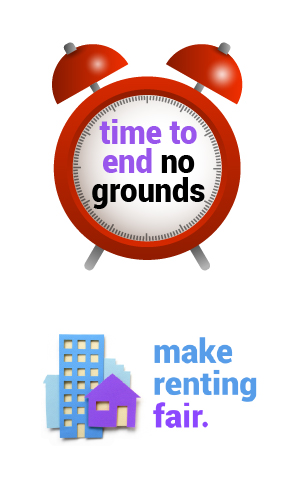
SUPPORT OUR WORK
Tenant Screening Tip: The Rental Application Cover Letter
by TVS | Feb 12, 2018 | Rental Forms
The rental application is a fundamental tool for landlords when it comes to finding the right tenants. But an application is only as good as the information contained in it. One way to obtain the best information — and weed out bad tenants — is for the landlord to attach a cover letter that explains the significance of the rental application.
Here are some tips for drafting the rental application cover letter:

Many property managers use a form letter or instruction sheet as a transmittal for the rental application. While this format looks official and sets a firm tone, using one of these forms is not always the most effective strategy.
Instruction sheets often are generic, with multiple check-off boxes. Not only is this confusing for the applicant, but it’s impersonal, which can discourage complete answers. Also, these forms can be intimidating. For instance, if the first line of the form is a list of all the personal documents the tenant must hand over, along with a demand for money, the applicant may become defensive. That resistance only encourages omissions and sketchy answers on the application, and turns off the best rental applicants. A letter format allows for a more personal, welcoming introduction, like:
“Thank you for your interest in the rental property located at 123 Main St. This is our rental application. Before you get started, let me explain how our process works.”
That makes the landlord’s subsequent demands more palatable — and less like a slap in the face.
The most important point to make in the cover letter is that the application is a legal document, and failure to provide complete and honest answers will be considered fraud. That can lead to the application being rejected, and may be a crime. Explain that the tenant will be asked to verify with a signature that the information is true and complete, and that each item will be verified. Warn the applicant that even if the application is approved, if it is based on false or misleading information, the tenancy may be terminated. This information should be one of the first things the applicant reads in the cover letter, and the applicant should read it before beginning to complete the application.
Explain that each adult occupant must complete a separate application based solely on that individual’s information.
Let applicants know they will be asked to consent to a tenant background check which will include a credit check, eviction and criminal histories, and confirmation of references. If the landlord cannot get in touch with the references, applicants must facilitate the reference process or the application may be denied. This will discourage applicants who were planning to bluff their way into the property by listing references who they know are unavailable.
Provide contact information and encourage the applicant to get in touch with any questions regarding the leasing process. Be approachable. Open communication will encourage truthful answers and sets the stage for a successful landlord-tenant relationship.
This post is provided by Tenant Verification Service, Inc. , helping landlords reduce the risks of renting with fraud prevention tools that include Tenant Screening , Tenant Background Checks , (U.S. and Canada), as well as Criminal Background Checks , and Eviction Reports (U.S. only).
Click Here to Receive Landlord Credit Reports .
Disclaimer: The information provided in this post is not intended to be construed as legal advice, nor should it be considered a substitute for obtaining individual legal counsel or consulting your local, state, federal or provincial tenancy laws.
Screening services for property managers and landlords. Select a market below.
Free Tips for Landlords
- Eviction Strategies
- Past Due Rent Collection
- Rental Forms
- Rental Property Management Tips
- Tenant Screening

Rental Agent Cover Letter Examples (Template & 20+ Tips)
Create a standout rental agent cover letter with our online platform. browse professional templates for all levels and specialties. land your dream role today.
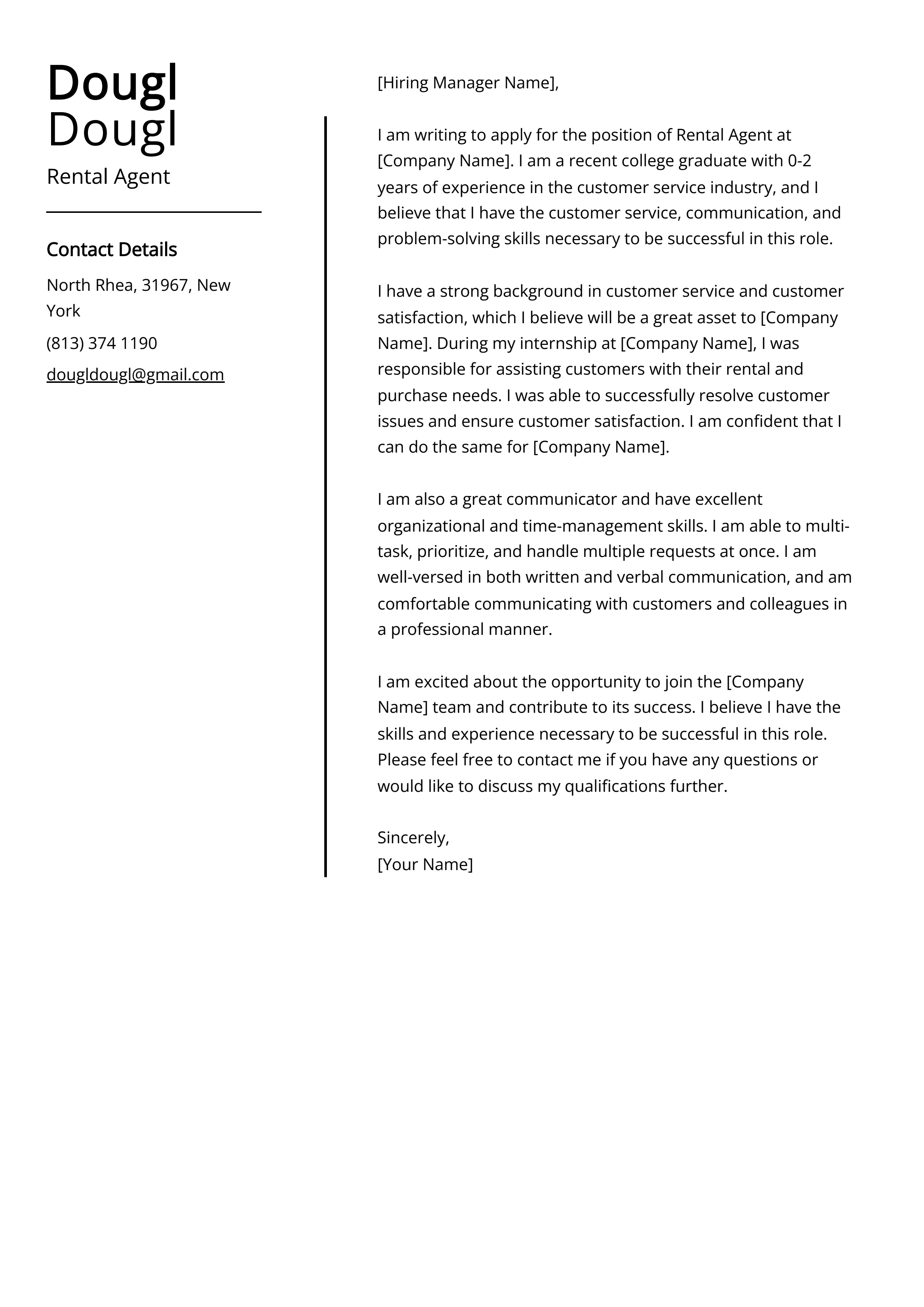
This guide provides essential tips and tricks for crafting a powerful Rental Agent cover letter that stands out. Whether you're a seasoned professional or a newbie in the rental industry, this guide is designed to help you effectively showcase your skills and experience, making a compelling case for your potential employer. We provide step-by-step instructions in presenting yourself as the perfect candidate for the job.
We will cover:
- How to write a cover letter, no matter your industry or job title.
- What to put on a cover letter to stand out.
- The top skills employers from every industry want to see.
- How to build a cover letter fast with our professional Cover Letter Builder .
- What a cover letter template is, and why you should use it.
Related Cover Letter Examples
- Account Representative Cover Letter Sample
- General Manager Cover Letter Sample
- Revenue Agent Cover Letter Sample
- Export Coordinator Cover Letter Sample
- Director of Communications Cover Letter Sample
- Field Sales Manager Cover Letter Sample
- Brand Specialist Cover Letter Sample
- Human Resources Manager Cover Letter Sample
- Counter Clerk Cover Letter Sample
- Experienced Insurance Sales Agent Cover Letter Sample
- Experienced Graphic Designer Cover Letter Sample
- Store Assistant Manager Cover Letter Sample
- Territory Sales Manager Cover Letter Sample
- Revenue Manager Cover Letter Sample
- Business Development Director Cover Letter Sample
- Crm Analyst Cover Letter Sample
- SEO Specialist Cover Letter Sample
- Advertising Sales Manager Cover Letter Sample
- Junior Buyer Cover Letter Sample
- Recruiter Cover Letter Sample
Rental Agent Cover Letter Sample
Dear Hiring Manager,
My name is John Doe and I am writing to express my interest in the Rental Agent position listed on your company’s website. I believe that my strong interpersonal skills, deep understanding of property industry, and passion for great customer service make me a perfect candidate for this role.
During my previous position as a Rental Agent at ABC Property Ltd, I managed a portfolio of over 100 properties, responding to tenant inquiries, conducting viewings, and closing rental agreement deals. I was recognized for the following achievements:
- Strong Negotiation Tactics: Enhanced profits by successfully using negotiation tactics to finalize leasing agreements. Over two years, My efforts contributed to a 15% revenue growth for the company.
- The Ability to Solve Problems: Regularly scheduled inspections and ensured maintenance issues were promptly addressed, maintaining high tenant satisfaction and retention rates.
- Customer service: Provided best-in-class service to both tenants and property owners, securing an average satisfaction rating of 98% in annual customer feedback surveys.
Furthermore, I am highly skilled in using property management software programs and have stayed updated with legal regulations relating to property rentals. I am confident that my ability to multitask combined with my extensive experience in taking on responsibilities will make me a valuable asset for your company.
I am thrilled about the opportunity to contribute to your reputable company and excited to bring my unique blend of skills and experiences to your team. I am confident that I can help to grow your business, while also continuing to grow and develop professionally within the role.
Thank you very much for considering my application. I am looking forward to possibly discussing how my set of skills, experiences, and commitment can be aligned to the success of your esteemed company.
Yours sincerely, John Doe
Why Do you Need a Rental Agent Cover Letter?
Writing a Rental Agent cover letter is a vital step in your job application process. Here's why:
- Creates a First Impression: Your cover letter serves as your first point of contact with the potential employer. A well-written cover letter introduces you in a professional manner and encourages the hiring manager to consider your application seriously.
- Illustrates Your Skills: A Rental Agent's job demands a specific set of skills such as good communication, customer service, and knowledge of rental regulations. Your cover letter allows you to give examples of when and how you've used these skills in your past experiences.
- Displays Your Motivation: Your cover letter allows you to demonstrate to the employer your passion and enthusiasm for the real estate sector and particularly, the role of a Rental Agent. This passion can often be a differentiating factor between you and the other applicants.
- Provides Information Not Included in Your Resume: Your resume outlines your skills, experience, and qualifications. However, it doesn't lend itself to providing personal narratives or explaining circumstances like employment gaps. Your cover letter can address these information gaps and add context to your resume.
- Persuades the Employer: A Rental Agent cover letter allows you to put forth convincing arguments as to why you are the best candidate for the role, thereby potentially increasing your chances of securing an interview.
- Demonstrates Your Professionalism: Lastly, writing a cover letter shows you understand professional etiquette. It signifies your willingness to put in effort and illustrates the seriousness with which you are approaching the job application process.
A Few Important Rules To Keep In Mind
When writing a cover letter for a Rental Agent position, it's important to adhere to these rules:
- Be Specific: Tailor your cover letter to the specific rental agent position you're applying for. Provide specific examples of your experience and achievements in the real estate industry, particularly related to rental or leasing activities. Avoid generic phrases.
- Be Professional: Maintain a formal and respectful tone throughout your letter. Avoid using slang words or informal language.
- Highlight Your Skills: Discuss the specific skills that make you a good fit for the job. These could include your ability to negotiate rental agreements, market properties effectively or provide exceptional customer service to tenants.
- Address the Hiring Manager by Name: If possible, find out the name of the individual who will be reading your cover letter and address them directly.
- Stay Concise: Your cover letter should not exceed one page. Be clear, succinct, and get right to the point.
- Proofread: Ensure your cover letter is error-free. Check your grammar, punctuation, and spelling thoroughly before sending.
- End with a Call to Action: Finish your letter by expressing your interest in an interview and your eagerness to discuss your qualifications further.
What's The Best Structure For Rental Agent Cover Letters?
After creating an impressive Rental Agent resume , the next step is crafting a compelling cover letter to accompany your job applications. It's essential to remember that your cover letter should maintain a formal tone and follow a recommended structure. But what exactly does this structure entail, and what key elements should be included in a Rental Agent cover letter? Let's explore the guidelines and components that will make your cover letter stand out.
Key Components For Rental Agent Cover Letters:
- Your contact information, including the date of writing
- The recipient's details, such as the company's name and the name of the addressee
- A professional greeting or salutation, like "Dear Mr. Levi,"
- An attention-grabbing opening statement to captivate the reader's interest
- A concise paragraph explaining why you are an excellent fit for the role
- Another paragraph highlighting why the position aligns with your career goals and aspirations
- A closing statement that reinforces your enthusiasm and suitability for the role
- A complimentary closing, such as "Regards" or "Sincerely," followed by your name
- An optional postscript (P.S.) to add a brief, impactful note or mention any additional relevant information.
Cover Letter Header
A header in a cover letter should typically include the following information:
- Your Full Name: Begin with your first and last name, written in a clear and legible format.
- Contact Information: Include your phone number, email address, and optionally, your mailing address. Providing multiple methods of contact ensures that the hiring manager can reach you easily.
- Date: Add the date on which you are writing the cover letter. This helps establish the timeline of your application.
It's important to place the header at the top of the cover letter, aligning it to the left or center of the page. This ensures that the reader can quickly identify your contact details and know when the cover letter was written.
Cover Letter Greeting / Salutation
A greeting in a cover letter should contain the following elements:
- Personalized Salutation: Address the hiring manager or the specific recipient of the cover letter by their name. If the name is not mentioned in the job posting or you are unsure about the recipient's name, it's acceptable to use a general salutation such as "Dear Hiring Manager" or "Dear [Company Name] Recruiting Team."
- Professional Tone: Maintain a formal and respectful tone throughout the greeting. Avoid using overly casual language or informal expressions.
- Correct Spelling and Title: Double-check the spelling of the recipient's name and ensure that you use the appropriate title (e.g., Mr., Ms., Dr., or Professor) if applicable. This shows attention to detail and professionalism.
For example, a suitable greeting could be "Dear Ms. Johnson," or "Dear Hiring Manager," depending on the information available. It's important to tailor the greeting to the specific recipient to create a personalized and professional tone for your cover letter.
Cover Letter Introduction
An introduction for a cover letter should capture the reader's attention and provide a brief overview of your background and interest in the position. Here's how an effective introduction should look:
- Opening Statement: Start with a strong opening sentence that immediately grabs the reader's attention. Consider mentioning your enthusiasm for the job opportunity or any specific aspect of the company or organization that sparked your interest.
- Brief Introduction: Provide a concise introduction of yourself and mention the specific position you are applying for. Include any relevant background information, such as your current role, educational background, or notable achievements that are directly related to the position.
- Connection to the Company: Demonstrate your knowledge of the company or organization and establish a connection between your skills and experiences with their mission, values, or industry. Showcasing your understanding and alignment with their goals helps to emphasize your fit for the role.
- Engaging Hook: Consider including a compelling sentence or two that highlights your unique selling points or key qualifications that make you stand out from other candidates. This can be a specific accomplishment, a relevant skill, or an experience that demonstrates your value as a potential employee.
- Transition to the Body: Conclude the introduction by smoothly transitioning to the main body of the cover letter, where you will provide more detailed information about your qualifications, experiences, and how they align with the requirements of the position.
By following these guidelines, your cover letter introduction will make a strong first impression and set the stage for the rest of your application.
Cover Letter Body
I am excited to apply for the Rental Agent position at your reputed company . I believe that my experience and skills align perfectly with your current requirements.
As a Rental Agent with XYZ Company , I have gained the necessary skills to be successful in this role. Here are some key aspects that I bring to the table:
- Proficiency in Lease Documentation: Over the years, I have developed a knack for understanding and interpreting lease terms and developing accurate lease documentation that benefits all parties involved.
- Strong Customer Service: Demonstrated ability to address tenant inquiries, resolve issues and maintain high levels of tenant satisfaction.
- Excellent Interpersonal Skills: I thrive in a people-oriented profession, having spent years developing my customer service skills in various roles.
- Ability to Multi-task: My experience has equipped me with the ability to juggle various tasks at the same time while also being detail-oriented.
I am confident that my aforementioned skills, coupled with my enthusiatic attitude and exceptional work ethic would greatly benefit your team.
In conclusion, I am eager to contribute my skills and expertise to your company's team . I look forward to the possibility of discussing my application with you further.
Thank you for considering my application.
Best regards,
Complimentary Close
The conclusion and signature of a cover letter provide a final opportunity to leave a positive impression and invite further action. Here's how the conclusion and signature of a cover letter should look:
- Summary of Interest: In the conclusion paragraph, summarize your interest in the position and reiterate your enthusiasm for the opportunity to contribute to the organization or school. Emphasize the value you can bring to the role and briefly mention your key qualifications or unique selling points.
- Appreciation and Gratitude: Express appreciation for the reader's time and consideration in reviewing your application. Thank them for the opportunity to be considered for the position and acknowledge any additional materials or documents you have included, such as references or a portfolio.
- Call to Action: Conclude the cover letter with a clear call to action. Indicate your availability for an interview or express your interest in discussing the opportunity further. Encourage the reader to contact you to schedule a meeting or provide any additional information they may require.
- Complimentary Closing: Choose a professional and appropriate complimentary closing to end your cover letter, such as "Sincerely," "Best Regards," or "Thank you." Ensure the closing reflects the overall tone and formality of the letter.
- Signature: Below the complimentary closing, leave space for your handwritten signature. Sign your name in ink using a legible and professional style. If you are submitting a digital or typed cover letter, you can simply type your full name.
- Typed Name: Beneath your signature, type your full name in a clear and readable font. This allows for easy identification and ensures clarity in case the handwritten signature is not clear.
Common Mistakes to Avoid When Writing a Rental Agent Cover Letter
When crafting a cover letter, it's essential to present yourself in the best possible light to potential employers. However, there are common mistakes that can hinder your chances of making a strong impression. By being aware of these pitfalls and avoiding them, you can ensure that your cover letter effectively highlights your qualifications and stands out from the competition. In this article, we will explore some of the most common mistakes to avoid when writing a cover letter, providing you with valuable insights and practical tips to help you create a compelling and impactful introduction that captures the attention of hiring managers. Whether you're a seasoned professional or just starting your career journey, understanding these mistakes will greatly enhance your chances of success in the job application process. So, let's dive in and discover how to steer clear of these common missteps and create a standout cover letter that gets you noticed by potential employers.
- Generalizing content: Avoid creating a general cover letter for every job application. Customize your letter to address the specific requirements of each rental agent job.
- Lengthy content: A cover letter should not be too long. It is recommended that your letter should not be more than one page long, as you only need to highlight your skills and qualifications.
- Neglecting to Proofread: Do not send your cover letter without proofreading. Grammatical errors and typos show a lack of attention to detail, which can deter potential employers.
- Not Including Relevant Experience: Do not forget to include details about your past relevant experiences in your cover letter. This can set you apart from other candidates.
- Unprofessional Tone: Your cover letter should not be too casual or informal. Using a professional tone is more appropriate for any job application, regardless of how casual the company’s culture may be.
- Lack of Confidence: Do not undersell yourself in your cover letter. Make sure you confidently present your skills, qualifications, and accomplishments.
- Using Overused Phrases: Avoid using clichés and tired phrases like "team player" or "hard worker". Use specific examples that showcase your skills and experiences instead.
- Repeating Your Resume: Your cover letter should not be a repetition of your resume. Instead, expand on some key points from your resume and provide more in-depth information.
Key Takeaways For a Rental Agent Cover Letter
- A Rental Agent cover letter allows you to sell your abilities to potential employers and highlight your skills in real estate leasing and tenant relationships.
- It is crucial to illustrate your knowledge about property laws, building maintenance, and tenant issues, including conflict resolution and negotiation techniques in your cover letter.
- Emphasize your interpersonal and communication skills as they are critical in dealing with tenants and other stakeholders. Highlight relevant instances where you have utilized these abilities.
- Mentioning your experience with property management software can also be a positive point, signifying your ability to keep records organized and easily retrievable.
- Pay special attention to your customer service abilities, integrity, attention to detail, professionalism, and reliability as these traits are highly valued in a Rental Agent.
- Imbed relevant sales achievements and performance metrics in your cover letter to give a sense of your efficacy and dedication to the job.
- Customize each cover letter for the specific role you are applying for and keep it concise. Hiring managers prefer to read cover letters that are direct and succinct.
- Proofread your Rental Agent cover letter before sending it to avoid errors and typos, which can leave a negative impression on potential employers.


COMMENTS
Why Write a Rental Cover Letter. Usually, cover letters are reserved for job applications. You might include a cover letter with your resume to summarize your strengths, past professional experiences, and your best qualities. A cover letter aims to show why you deserve the job and what makes you unique in a pool of applicants.
Download a Word document of the rent cover letter template. (Your Name) (Address) (City, State Zip) (Date) (Landlord or Property Manager Name) (Address) (City, State Zip) Dear (Name of landlord or property manager), My name is (Your name) and I have a keen interest in renting the apartment you have available at (Property name or address).
Step Two: Define Your Budget. Our general rule of thumb for renters is to spend no more than 30% of your monthly income on rent — but this can be a grey area for students who are renting, but not working full-time. Your budget will depend on your financial situation.
Include a brief cover letter that gives an overview of your household. Mention your interest in the rental and your ability to be a responsible tenant. ... Many landlords who rent to students require a co-guarantor for the rent. Mention in your cover letter that you will provide one upon request and have the form filled out and ready to go, but ...
This can help the lessor get to know you on a personal level and can set you apart from other applicants. 4. Be concise: Keep your cover letter short and to the point, focusing on the most important information. Aim for around 200-300 words, and avoid repeating information that is already included in your application.
Lauren Maier. A renter cover letter is a letter written by wannabe renters for potential future landlords or property management companies. Rental cover letters are meant to showcase a renter's character and best attributes to boost their reputation and odds of getting the desired lease.
Content. Top ↑ College Student Cover Letter Example 5 Steps for the Perfect College Student Cover Letter #1. Put Contact Information in the Header #2. Address the Hiring Manager #3. Write an Eye-Catching Opening Statement #4. Use the Cover Letter Body for the Details #5.
On the application. What you include (or don't) on your application can have a big impact on whether it stands out or is shuffled to the bottom of the pile. In addition, certain issues raise red flags on the application. Avoid them by taking the following steps. Fill in the application completely.
There's no better place to start than your inquiry cover letter. Your cover letter should establish three things: Who you are. Make yourself a person whom the landlord can connect to. You might find yourself meeting important markers for the landlord, too. A landlord wants a responsible tenant who is going to care for the property and not tear ...
Rental Application Cover Letter Template. Dear [Landlord/Property Manager's Name], I am writing to express my interest in the [Property Address] listed [where you found the listing]. As a [Your Job Title] at [Your Employer] with [Number of Years/Months] years of stable employment, I am excited about the possibility of making this property my ...
Student cover letter example Here is a sample cover letter for a student that you can use as a guide to write an impressive cover letter of your own: Kellen Daniels 555-555-5555 [email protected] December 10, 2020 Dear Hiring Manager, I am a sophomore business major at Houston University writing to express my interest in the Online Advertising Intern opportunity at Blueprint Digital.
Subject; Application cover letter for (address of property) 4 min read. 7 min read. Dear (name of property manager or landlord) My name is (applicant name) and along with (applicant name), we would like to formally apply for the rental property at (address) as advertised at (URL). We previously lived at (address) for (amount of time) and paid ...
Here are tips on how to format your cover letter properly: Include an introduction, two to three body paragraphs, and a conclusion. Keep the font size between 10.5 and 12 points (be sure to choose a professional cover letter font). Make sure the margins are ½"-1" on all sides side. 3. Open with a strong introduction.
In writing the rental cover letter, be sure that its contents match those in the rental application form you filed with the landlord or rental agency. You have to be very careful as well in filling up the application form at the outset. Accomplish a winning rental application form just as you would in writing a cover rental application letter.
Use this Student cover letter example to finish your application and get hired fast - no frustration, no guesswork. This cover letter example is specifically designed for Student positions in 2024. Take advantage of our sample sentences + expert guides to download the perfect cover letter in just minutes. 4.7.
Before writing your renter cover letter, it's important to understand how some information that you provide could be used to discriminate against you, potentially leading to a rejection of your rental application. To help avoid discriminatory outcomes, the Canadian Centre for Housing Rights (CCHR) has developed this toolkit, including two ...
Best Cover Letter Greetings: The greeting in your cover letter should be professional and personalized whenever possible. If you know the hiring manager's name, use it; if not, address the team or company as a whole. 1. "Dear Hiring Manager," 2. "Hello [Company Name] Team," 3. "Greetings [Department Name] Department,"
An essential part of the application process undertaken by prospective tenants is writing a great cover letter. A cover letter for tenants is just like cover letters for job applications. Yes! That's why it sounds so familiar. The goal of a cover letter is to present the tenant in the best light to the landlord. The cover letter summarises all ...
Thank you so much for considering my rental application. I am looking forward to hearing from you. Sincerely, [Signature] [Your Name] [Your phone number] [Your email address] Cover letters are not required in rental applications. However, it can be helpful to write a letter to the landlord introducing yourself and anyone else who will be living ...
The rental application is a fundamental tool for landlords when it comes to finding the right tenants. But an application is only as good as the information contained in it. One way to obtain the best information — and weed out bad tenants — is for the landlord to attach a cover letter that explains the significance of the rental application.
Cover Letter Body. Dear Hiring Manager, I am excited to apply for the Rental Agent position at your reputed company. I believe that my experience and skills align perfectly with your current requirements. As a Rental Agent with XYZ Company, I have gained the necessary skills to be successful in this role.